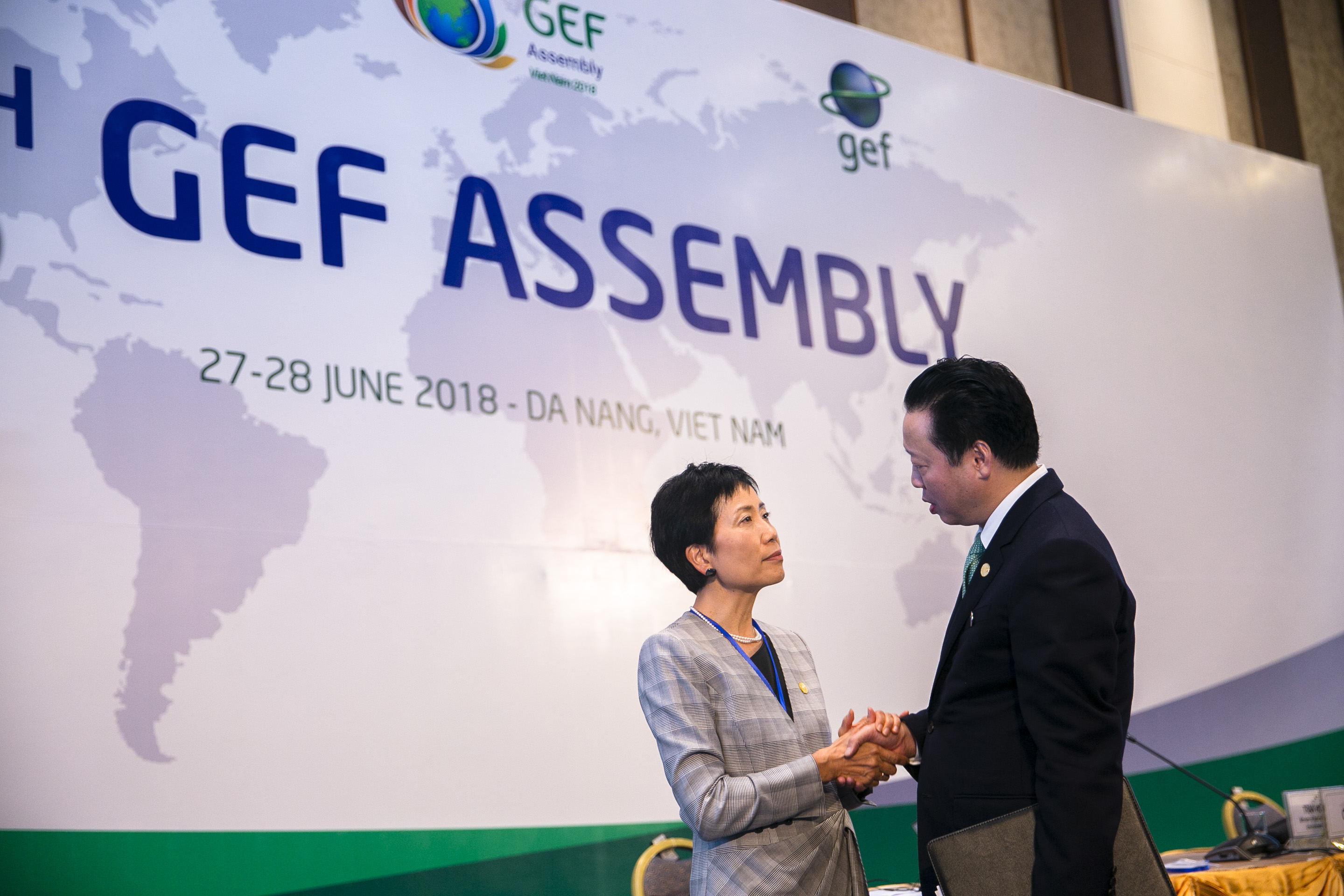
GEF Chief Executive Officer (CEO) and Chairperson Naoko Ishii congratulating Trần Hồng Hà, Minister of Natural Resources and Environment, Viet Nam, on the close of the sixth GEF Assembly
The sixth Assembly of the Global Environment Facility (GEF) convened for its last day on Thursday, 28 June 2018, in Da Nang, Viet Nam.
In the morning, participants convened in seven parallel roundtable discussions on: sustainable forest management; preventing a toxic legacy: transforming the chemicals industry; wildlife; gender and the environment; innovation in clean energy; conservation finance; and sustainable drylands.
In the afternoon, an interactive panel discussion moderated by Jan Piotrowski, Environment Correspondent, The Economist, reported back from the high-level roundtable dialogues. On ways to deliver transformational change to safeguard the global commons, panelists suggested, inter alia: communicating effectively; delivering quantified data on environmental externalities to enable better investment decisions by governments; and creating a diverse platform with actors from different stakeholder groups that empowers these to push forward transformations.
Participants then heard a keynote address from the President of Guyana David Granger, in which he called for enhanced financial and technical assistance, and capacity building as part of a grand global transformative agenda to address environmental challenges.
In a message from civil society, Priscilla Achakpa, Women Environmental Programme, Nigeria, highlighted recommendations to the GEF Secretariat and the wider Partnership from 538 CSOs in the wider GEF-CSO network, including on the need to recognize that partnerships between the GEF and the civil society are key to achieve transformational change.
The Assembly took note of the:
- Report on the GEF-7 Replenishment;
- Sixth Overall Performance Study of the GEF; and
- Report of the Scientific and Technical Advisory Panel.
The Report on the GEF-7 Replenishment included a summary of negotiations, programming directions and resource allocation, and policy recommendations for GEF-7, along with a draft GEF-7 replenishment resolution for approval by the World Bank Executive Directors.
Expressing gratitude to the Government of Viet Nam, the city of Da Nang, the GEF Secretariat, volunteers and participants for their contributions to the Assembly, GEF CEO and Chairperson Naoko Ishii reiterated her belief that the GEF can play an extremely useful role in catalyzing the change needed to address environmental challenges.
GEF Assembly Chair Trần Hồng Hà, Minister of Natural Resources and Environment, Viet Nam, noted that he had been inspired by the Assembly’s commitment to addressing the pressing issues related to marine plastics, biodiversity loss, and the blue economy, and closed the meeting at 4:33 pm.
On Friday, 29 June 2018, participants visited GEF-funded projects in and around Da Nang.
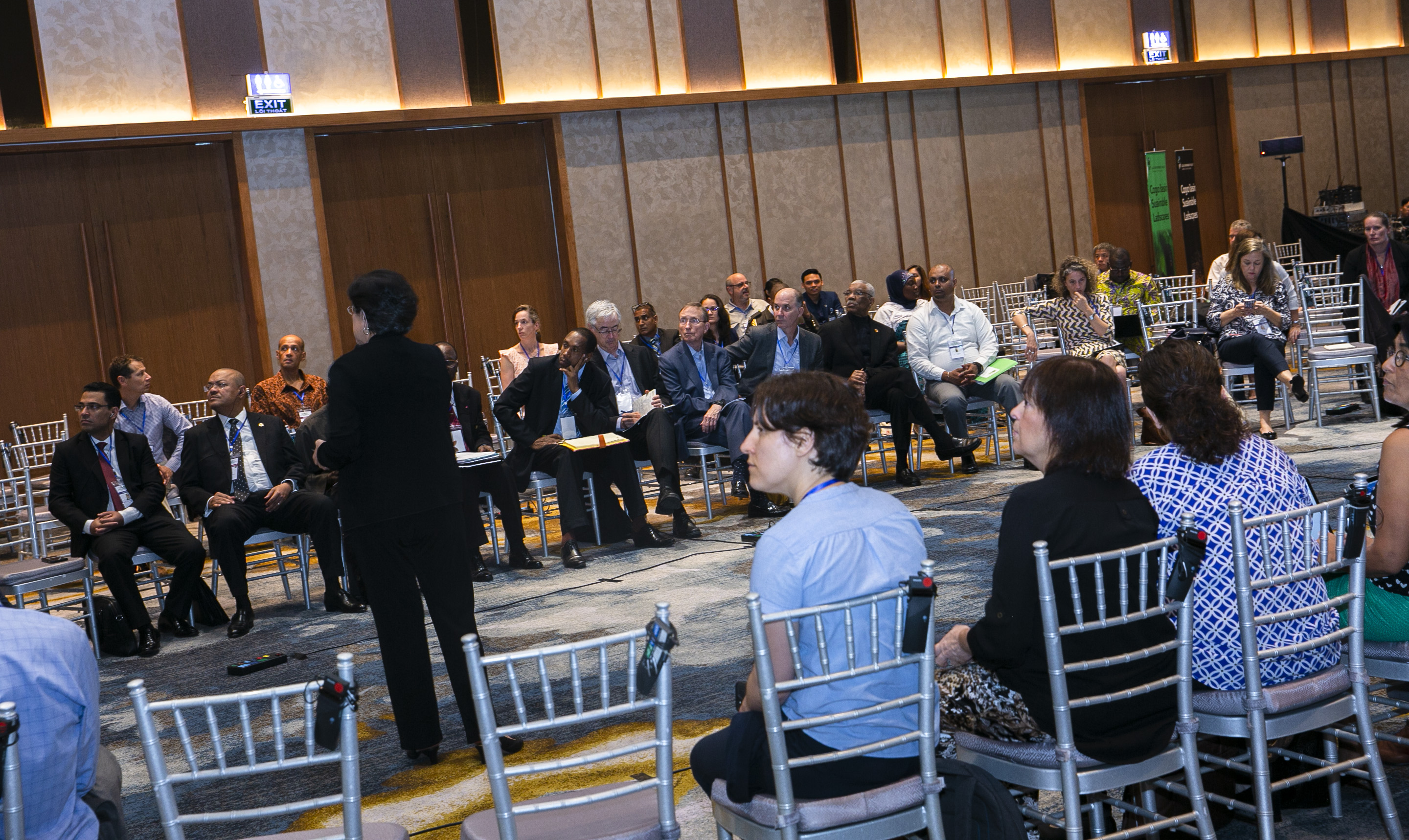
Roundtable discussions on 'sustainable landscapes in the Amazon and Congo Basin'
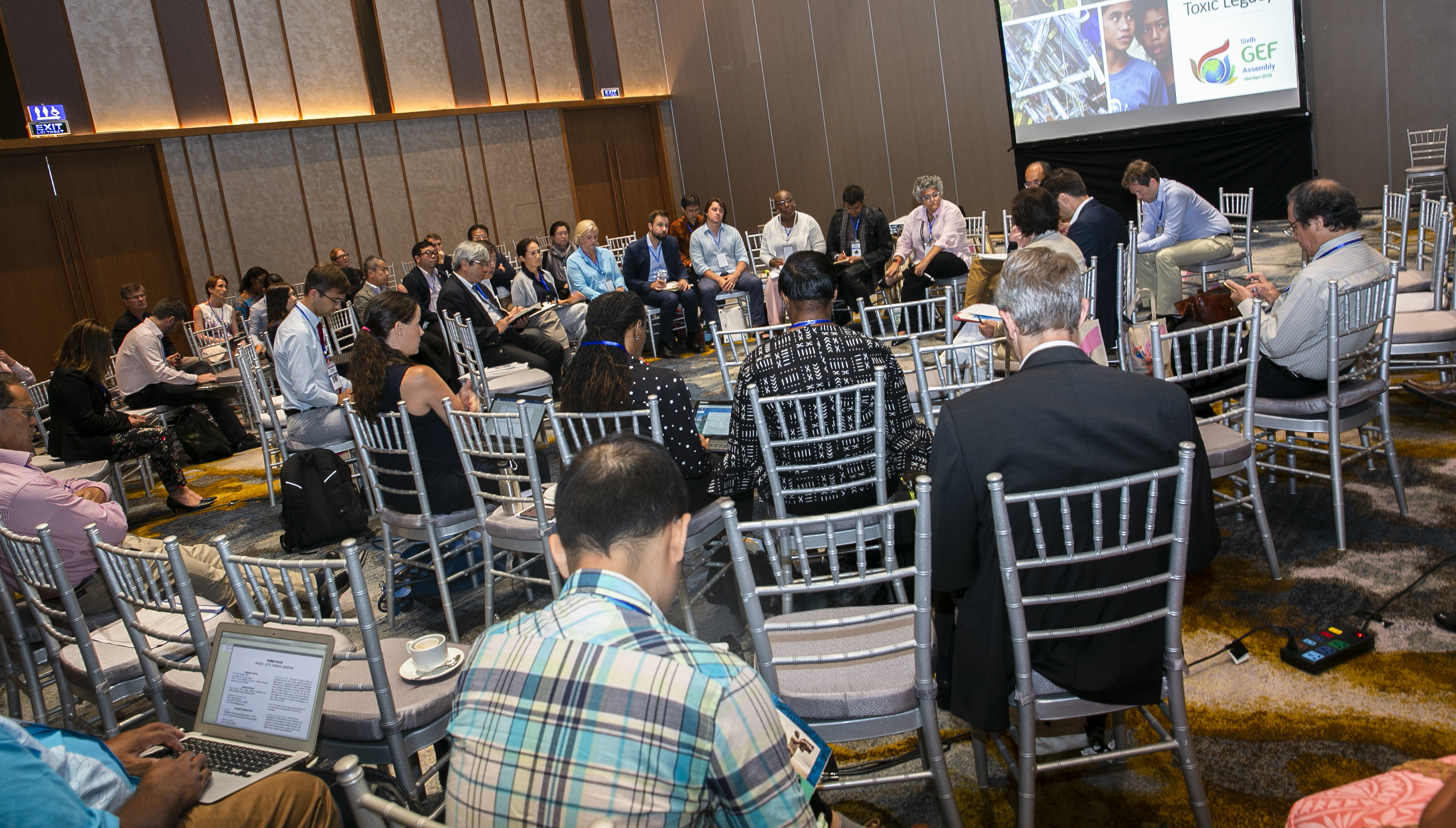
Roundtable discussions on 'preventing a toxic legacy:
transforming the chemicals industry'

Roundtable discussions on 'wildlife'
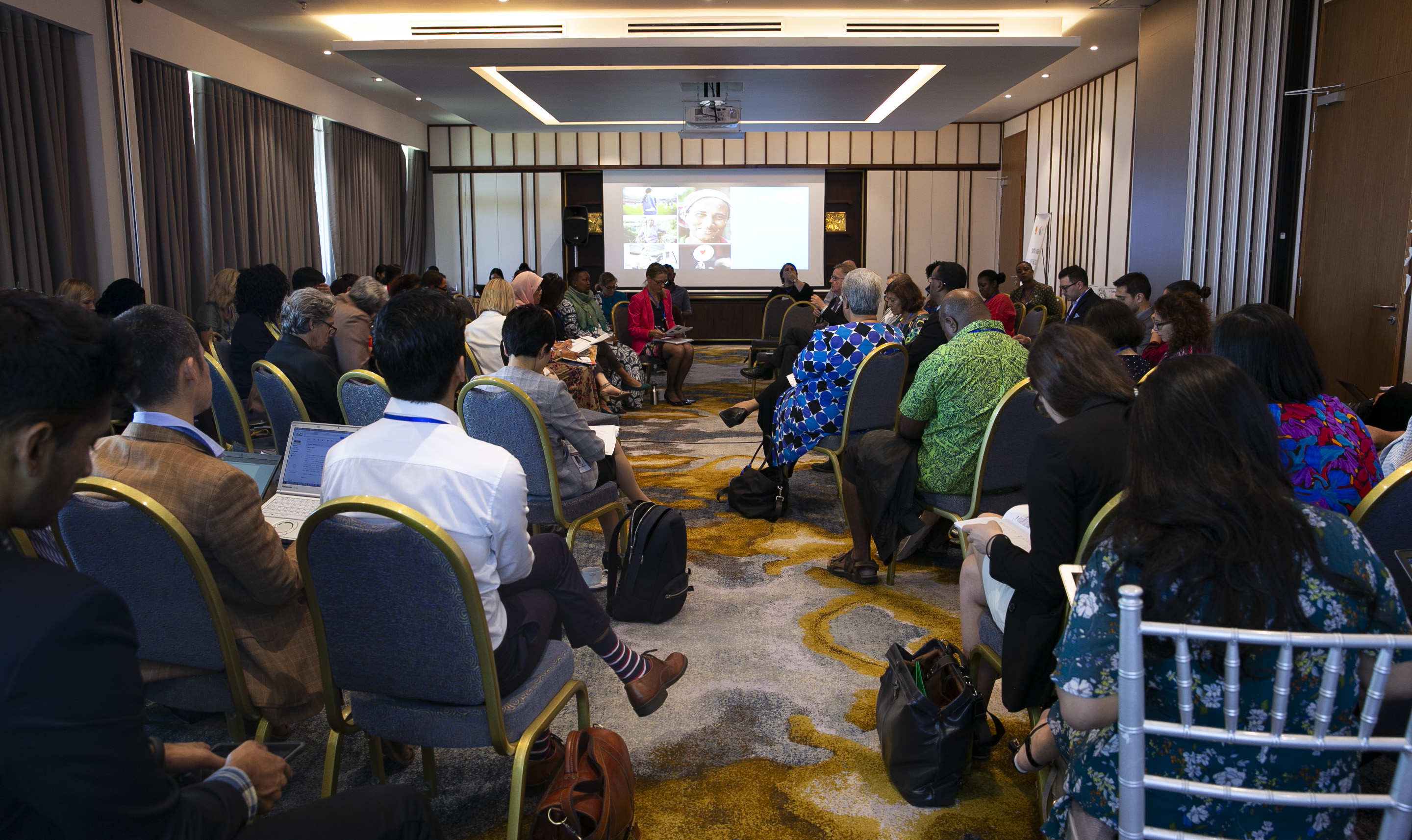
Roundtable discussions on 'gender and the environment'
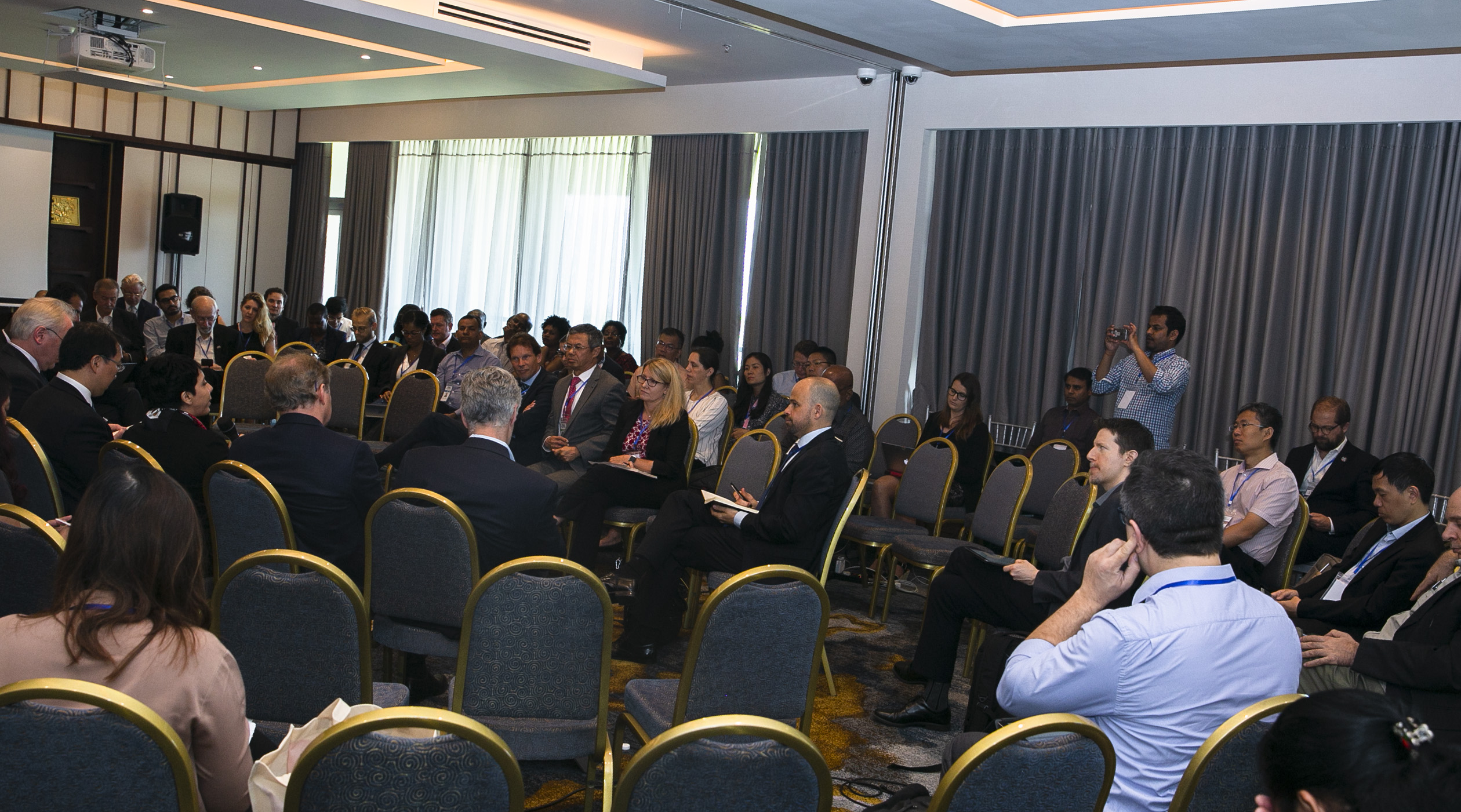
Roundtable discussions on 'conservation finance'
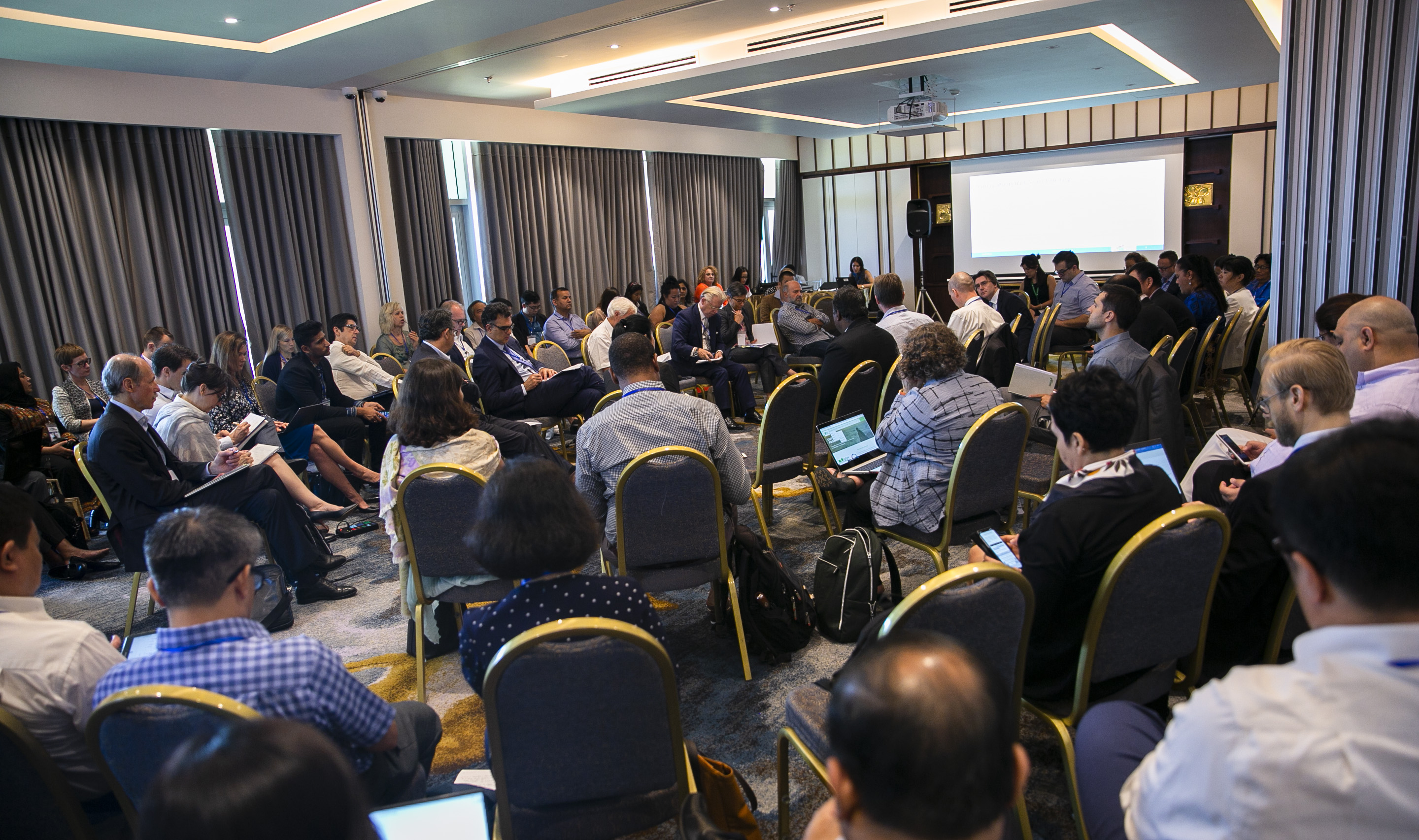
Roundtable discussions on ‘innovation in clean energy’
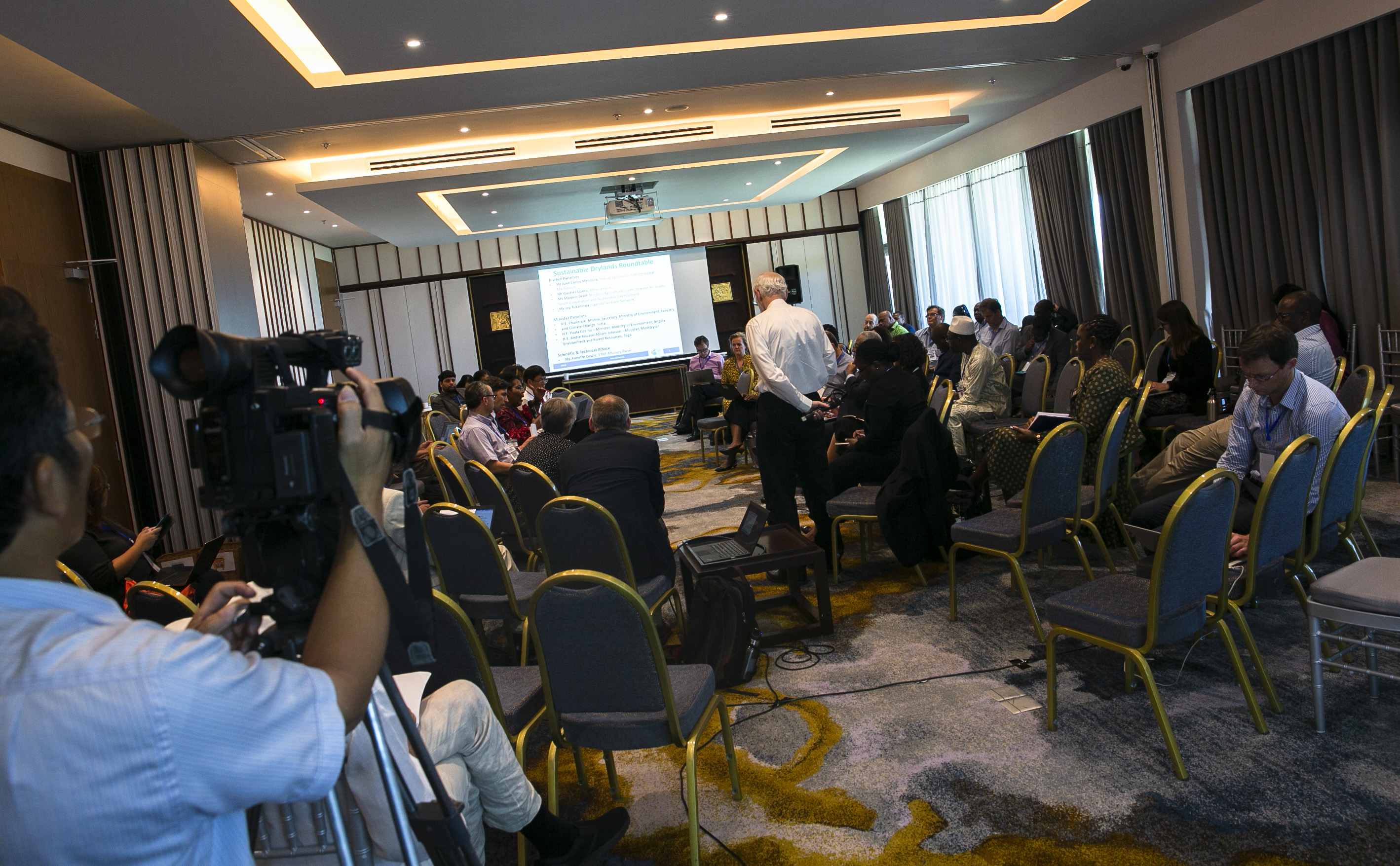
Roundtable discussions on 'sustainable drylands'
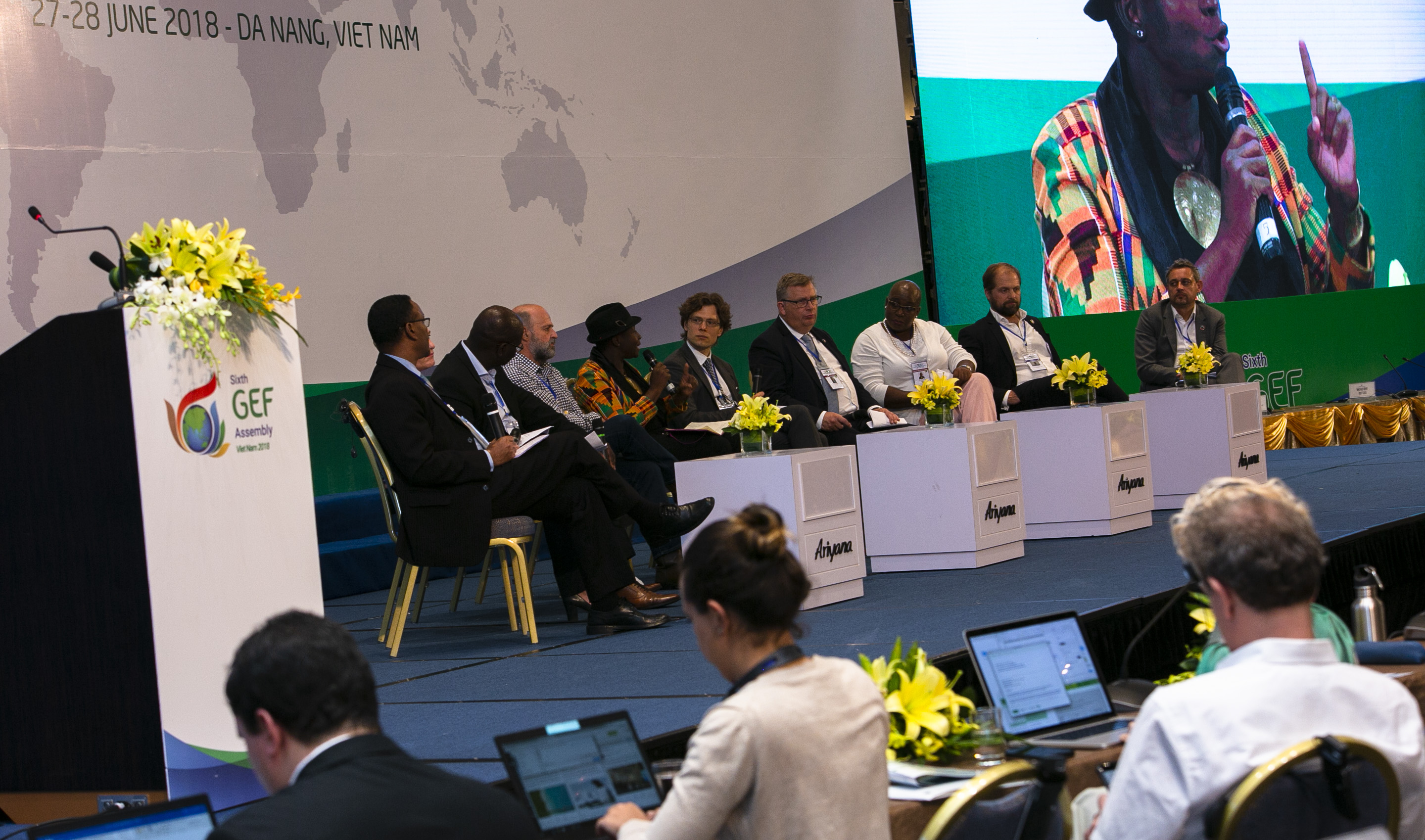
The panel during the roundtable wrap-up session
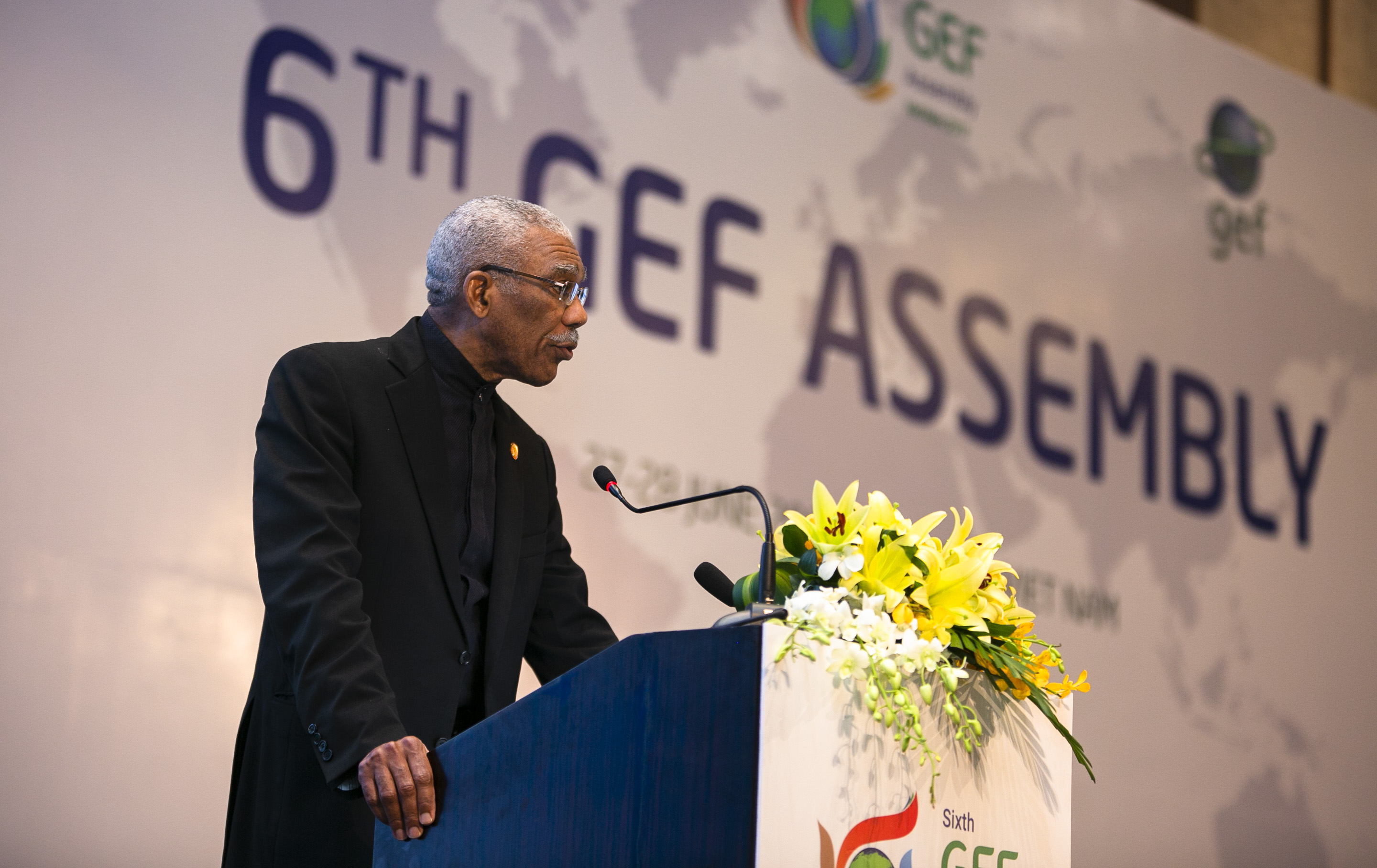
President David Granger, Guyana
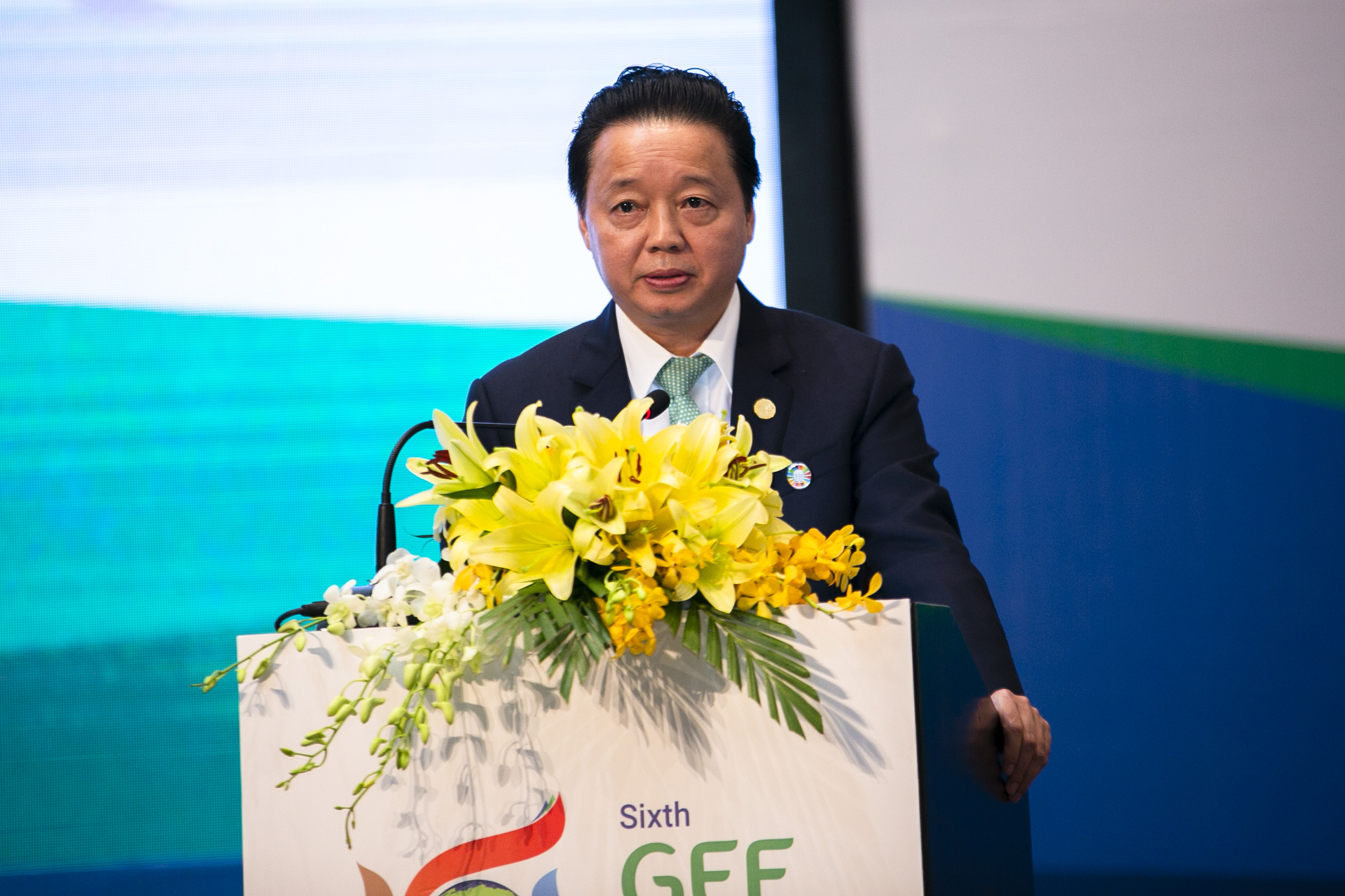
Chair Trần Hồng Hà, Minister of Natural Resources and Environment, Viet Nam
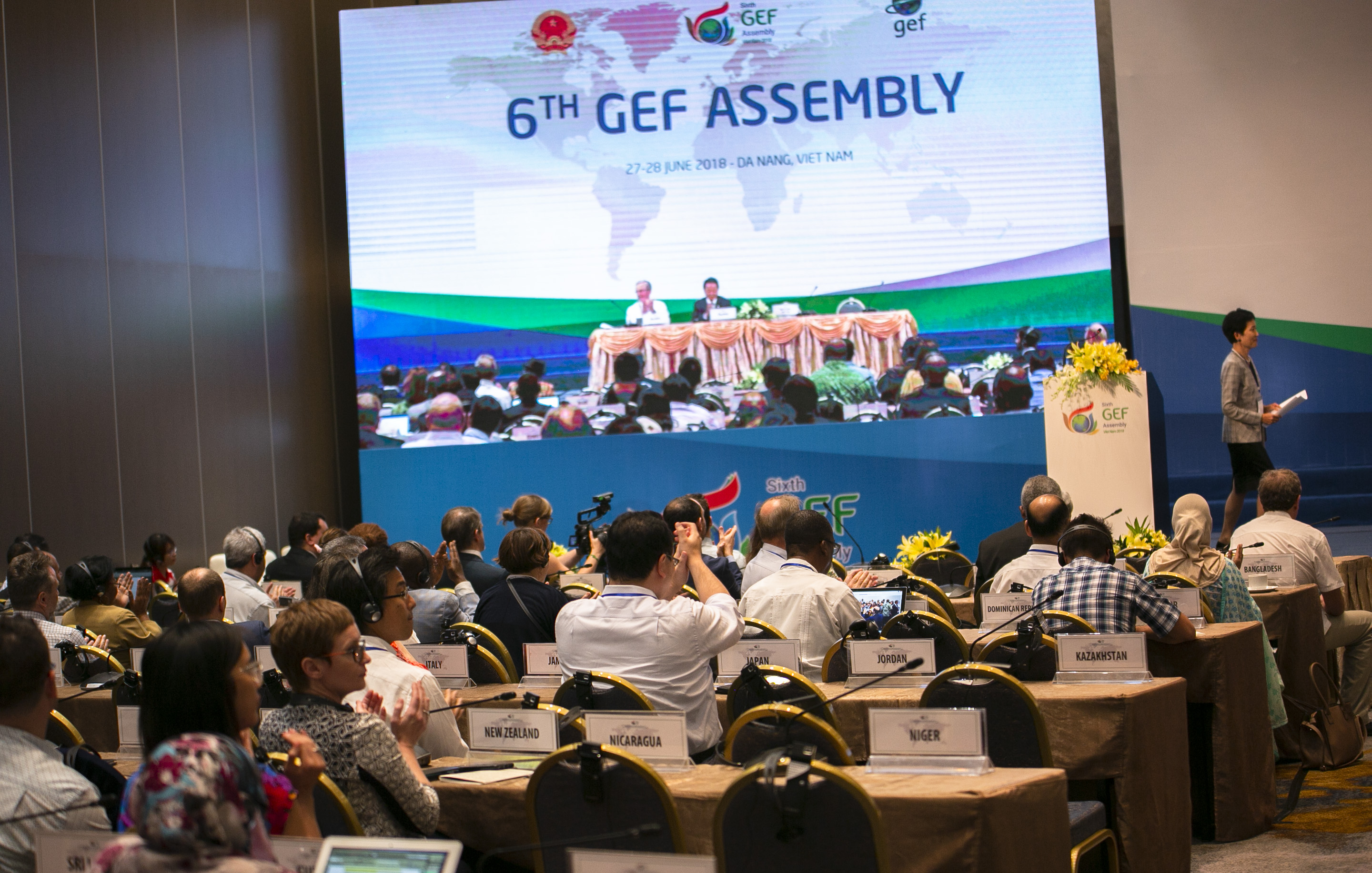
Participants applaud the close of the sixth GEF Assembly
IISD Reporting Services, through its ENB+ Meeting Coverage, is providing daily photo and video coverage, and has produced a summary report from the GEF Council Consultation Meeting with CSOs, 54th GEF Council Meeting, 24th Meeting of the LDCF/SCCF Council, and 6th GEF Assembly.
Photos by IISD/ENB | Sean Wu
+ Visit the web coverage for Thursday, 28 June 2018
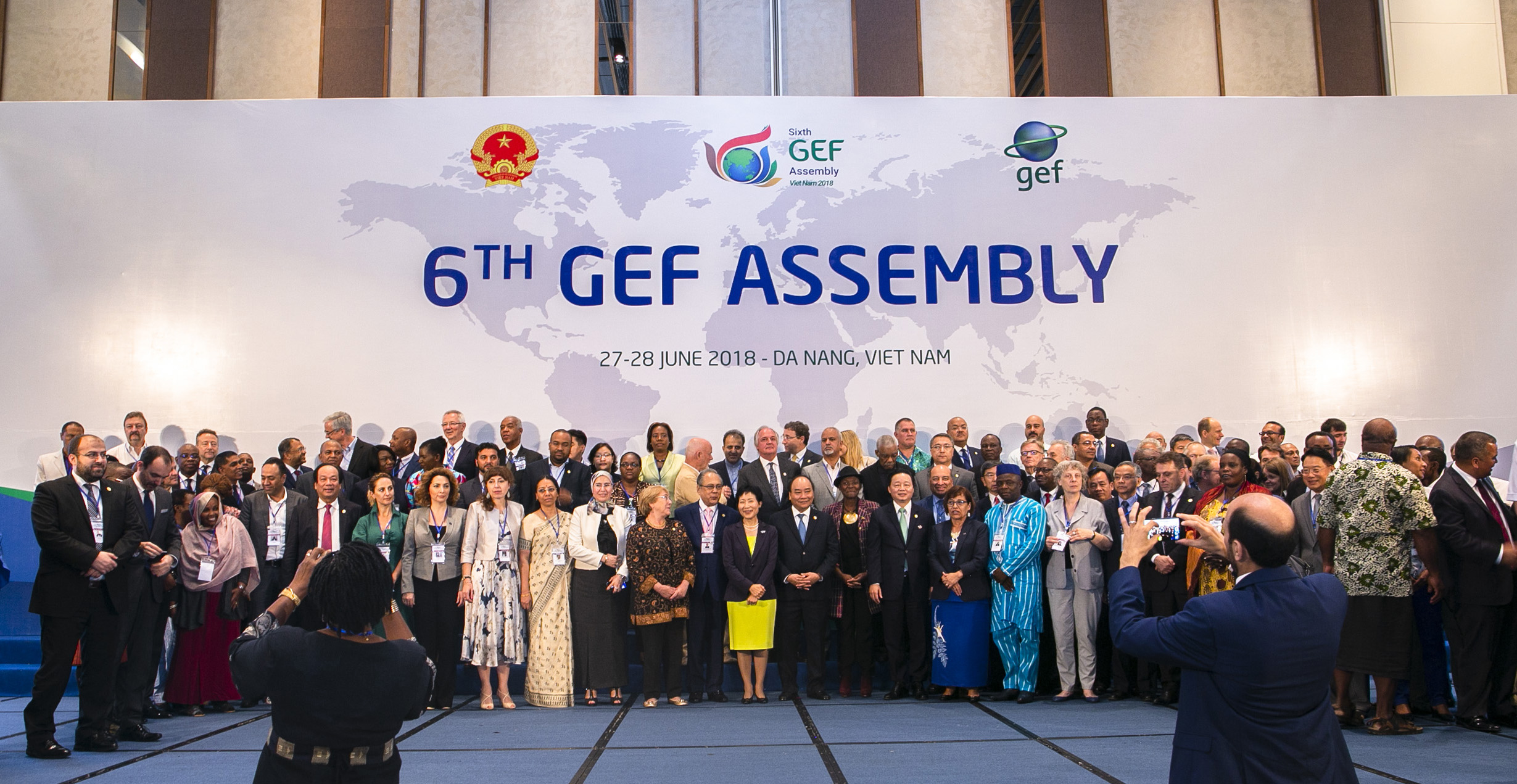
A group photo of high-level participants at sixth GEF Assembly
The sixth Assembly of the Global Environment Facility (GEF) opened on Wednesday, 27 June 2018, in Da Nang, Viet Nam, with participants electing Trần Hồng Hà, Minister of Natural Resources and Environment, Viet Nam, as Chair.
In his opening address, Prime Minister Nguyễn Xuân Phúc, Viet Nam, called on delegates to: identify key environmental challenges and formulate effective solutions; evaluate the effectiveness of existing cooperation mechanisms; and propose inter-regional and interdisciplinary projects to address the underlying causes of environmental degradation. GEF CEO and Chairperson Naoko Ishii said that the ecosystems that are at the very foundation of economies and societies must be restored, and that transformations are not only needed but possible and “good for all of our lives.”
After hearing a “message from science” delivered by Johan Rockström, Executive Director, Stockholm Resilience Centre, and Rosina Bierbaum, Chair, GEF Scientific and Technical Advisory Panel, delegates heard interactive panel discussions on delivering transformation and the seventh GEF replenishment’s role in systems change. Participants also heard inspiring messages from President Hilda Heine of the Marshall Islands and Former President of Chile Michelle Bachelet.
In the afternoon, participants met in seven parallel roundtable discussions sessions on:
- food, land use and restoration;
- sustainable cities;
- blue economy;
- partnerships for implementing the 2030 Agenda;
- science-based targets for the Earth;
- circular economy; and
- marine plastics.
In the evening, the government of Viet Nam hosted a reception.
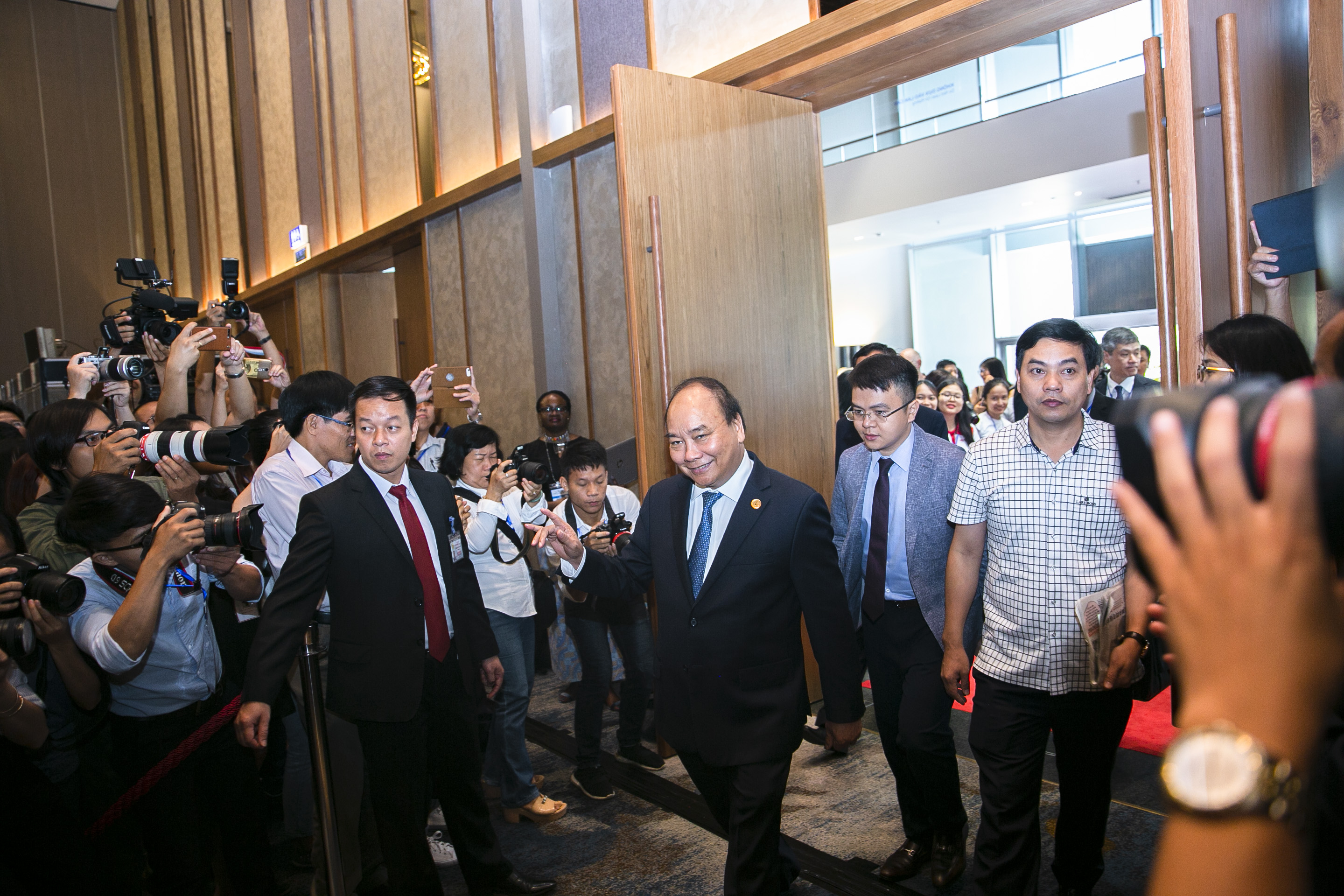
Prime Minister Nguyễn Xuân Phúc, Viet Nam
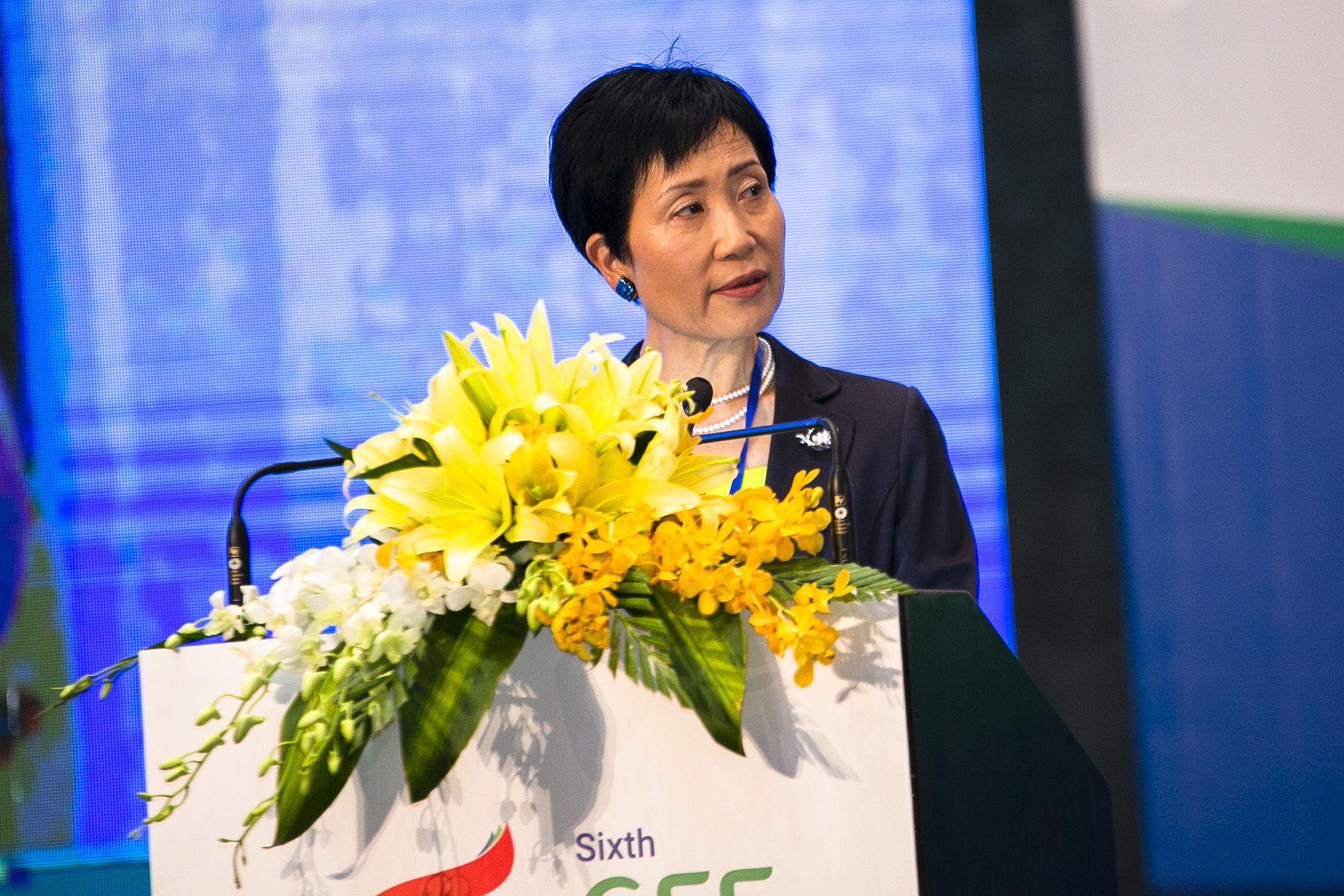
GEF Chief Executive Officer (CEO) and Chairperson Naoko Ishii
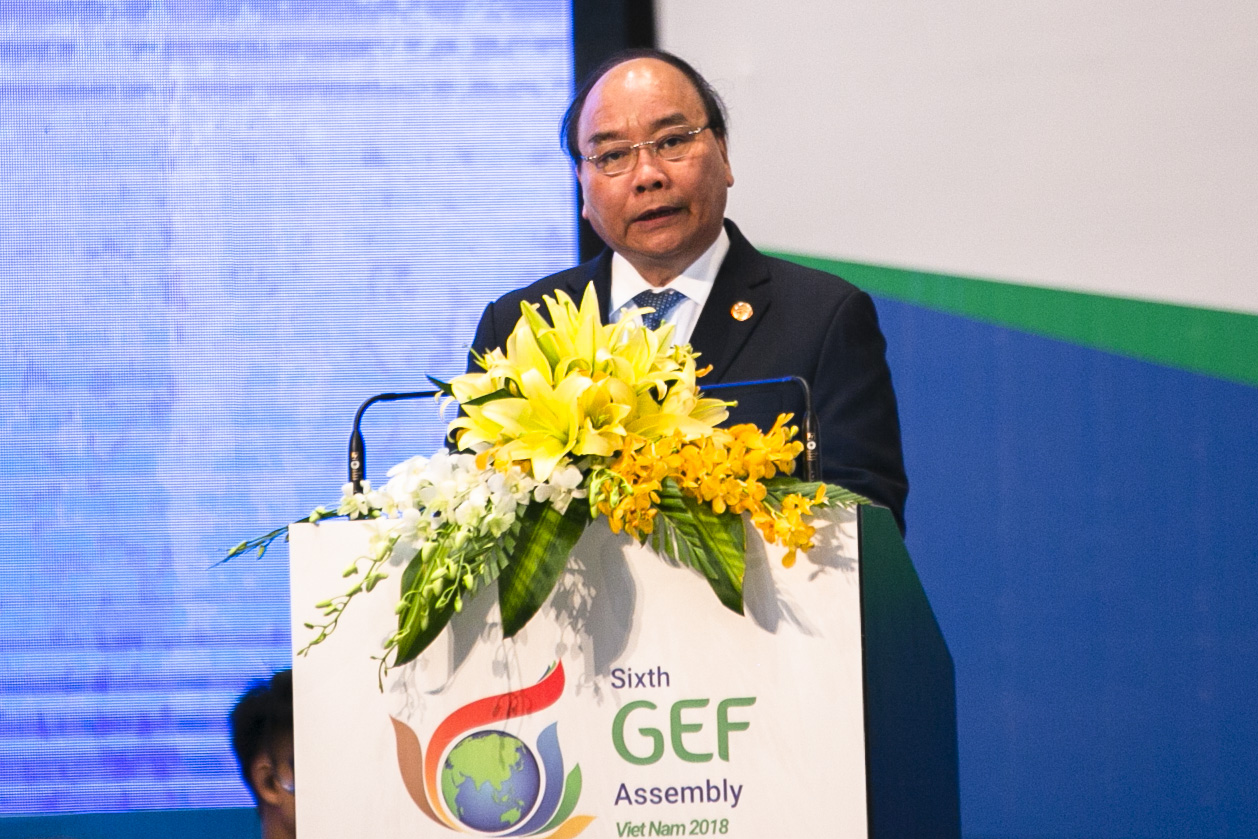
Prime Minister Nguyễn Xuân Phúc, Viet Nam
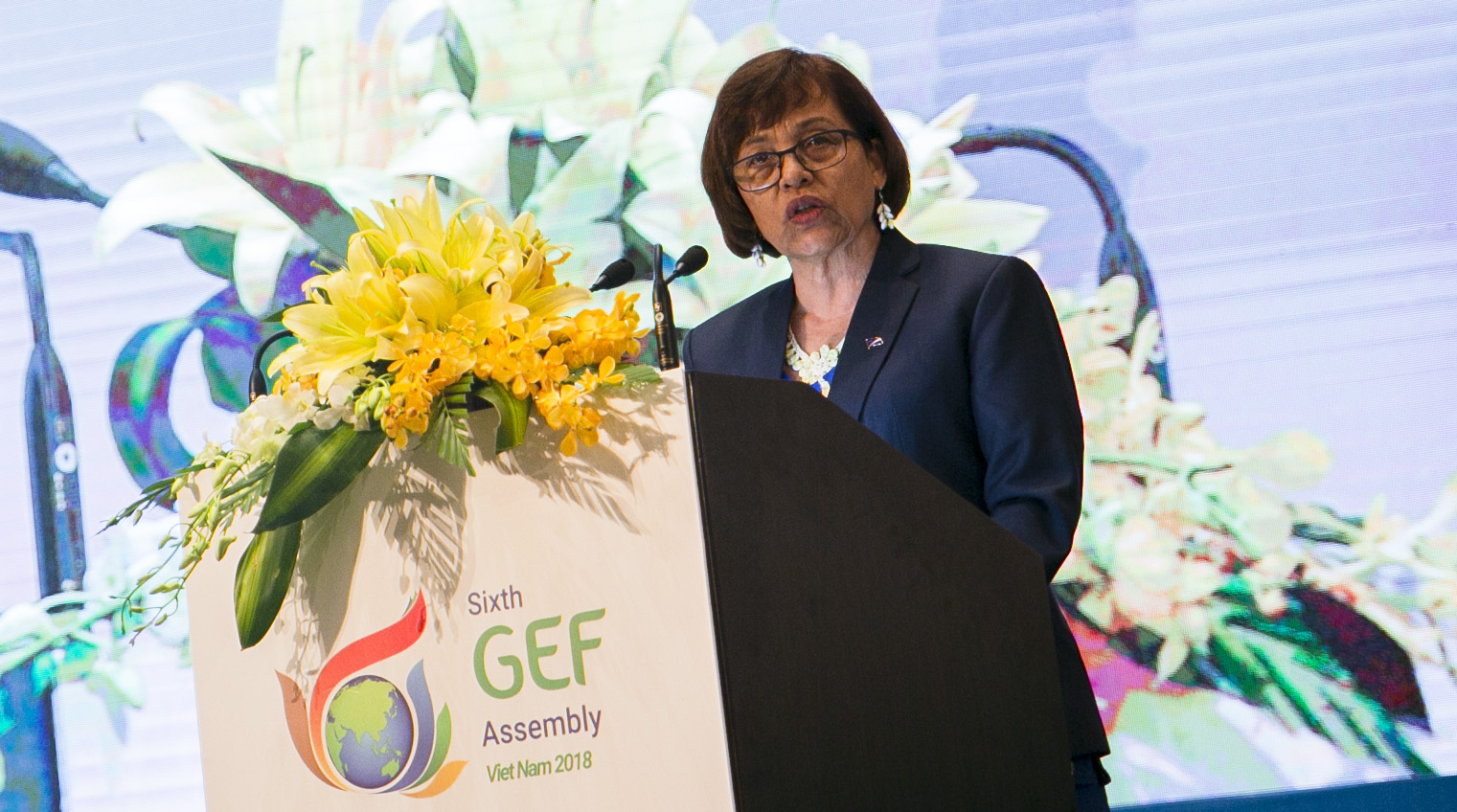
Hilda Heine, President of the Marshall Islands
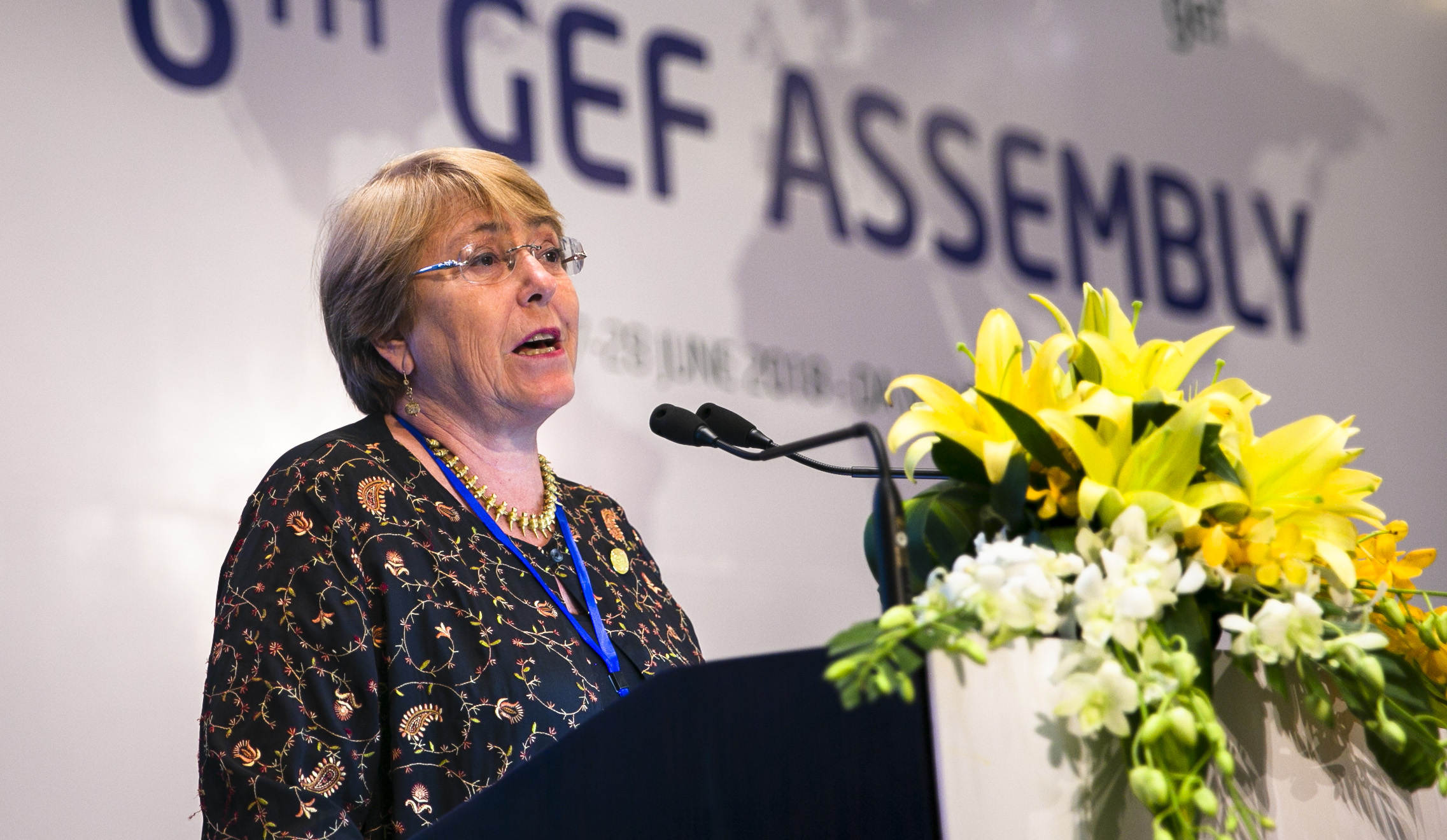
Michelle Bachelet, Former President of Chile
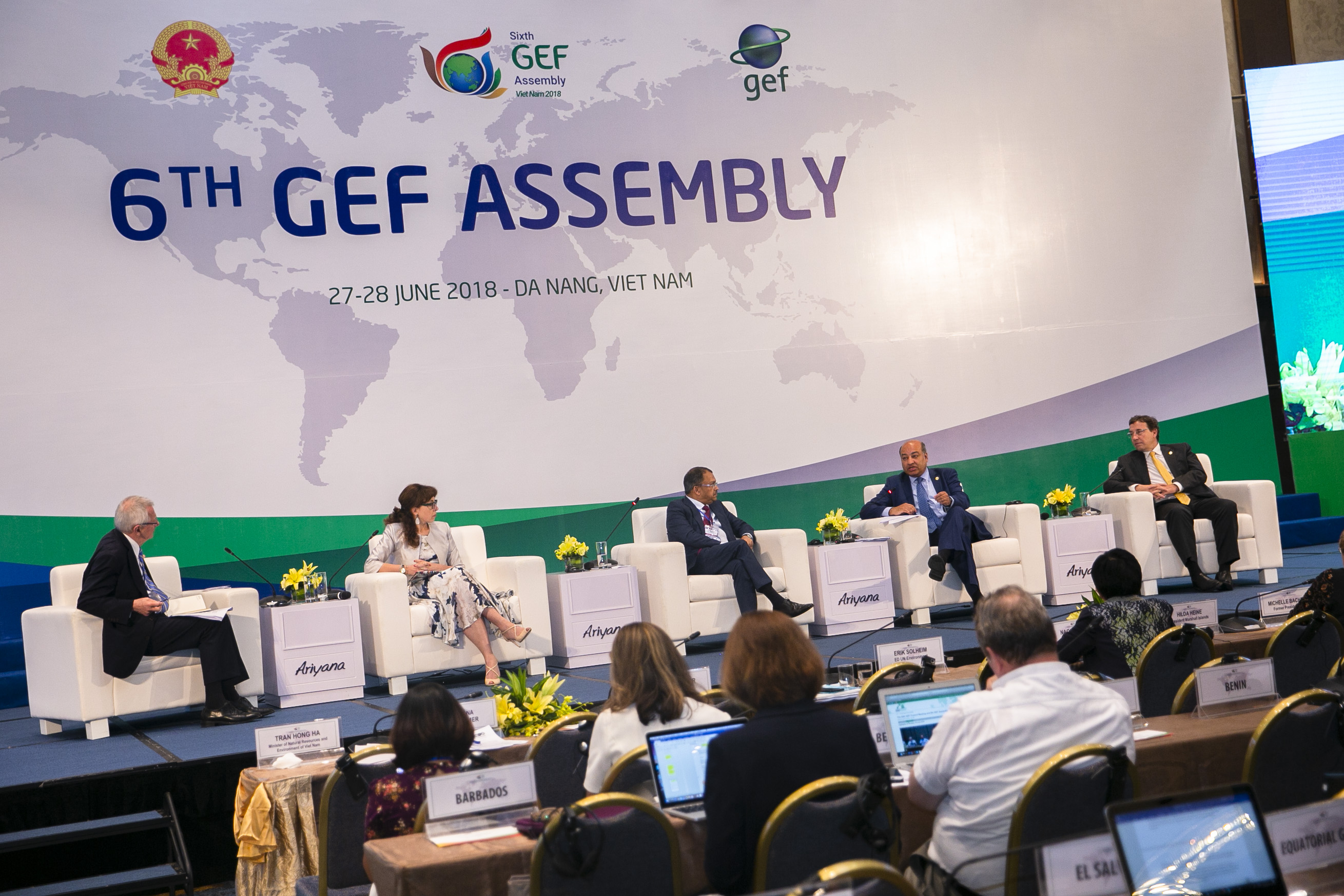
L-R: Andrew Steer, President and CEO, WRI; Cristiana Paşca Palmer, Executive Secretary, CBD; Sunny Verghese, Co-Founder and Group CEO, Olam International; Suma Chakrabarti, President, European Bank for Reconstruction and Development (EBRD); and Achim Steiner, Administrator, UNDP

Roundtable discussions on 'marine plastics'
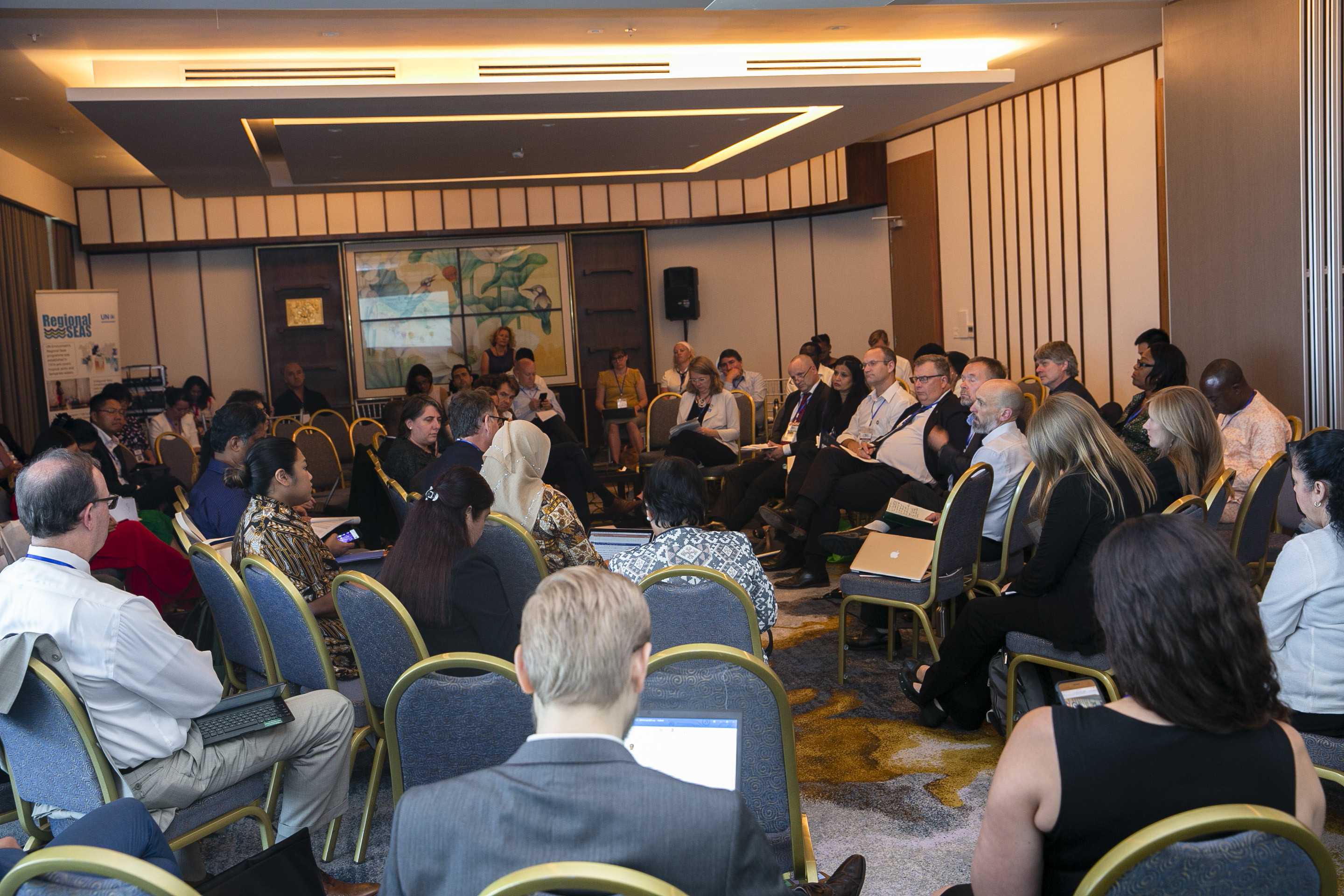
Roundtable discussions on 'circular economy'
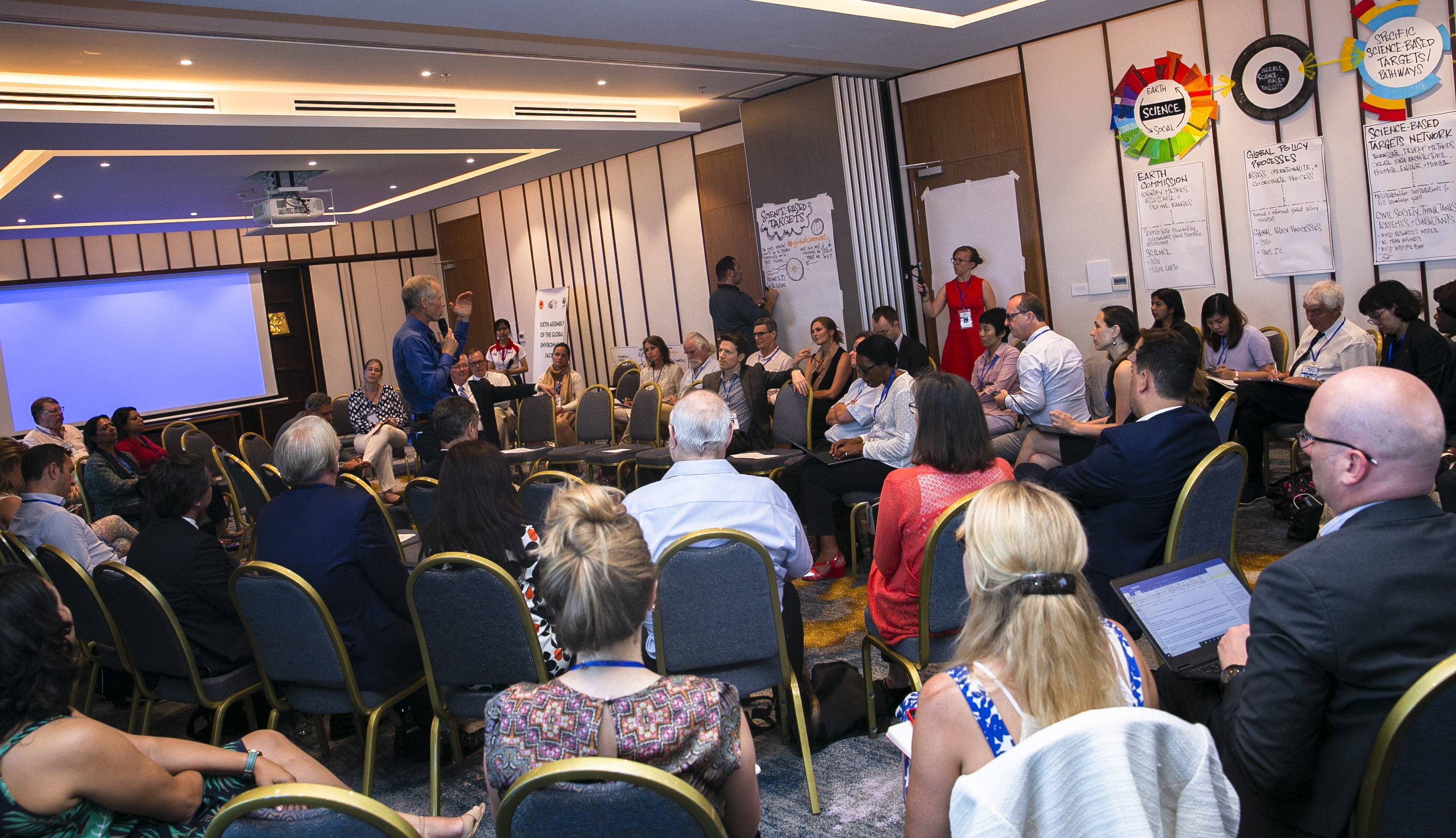
Roundtable discussions on 'science-based targets for the Earth'
IISD Reporting Services, through its ENB+ Meeting Coverage, provided daily photo and video coverage, and has produced a summary report from the GEF Council Consultation Meeting with CSOs, 54th GEF Council Meeting, 24th Meeting of the LDCF/SCCF Council, and 6th GEF Assembly.
Photos by IISD/ENB | Sean Wu
+ Visit the web coverage for Wednesday, 27 June 2018
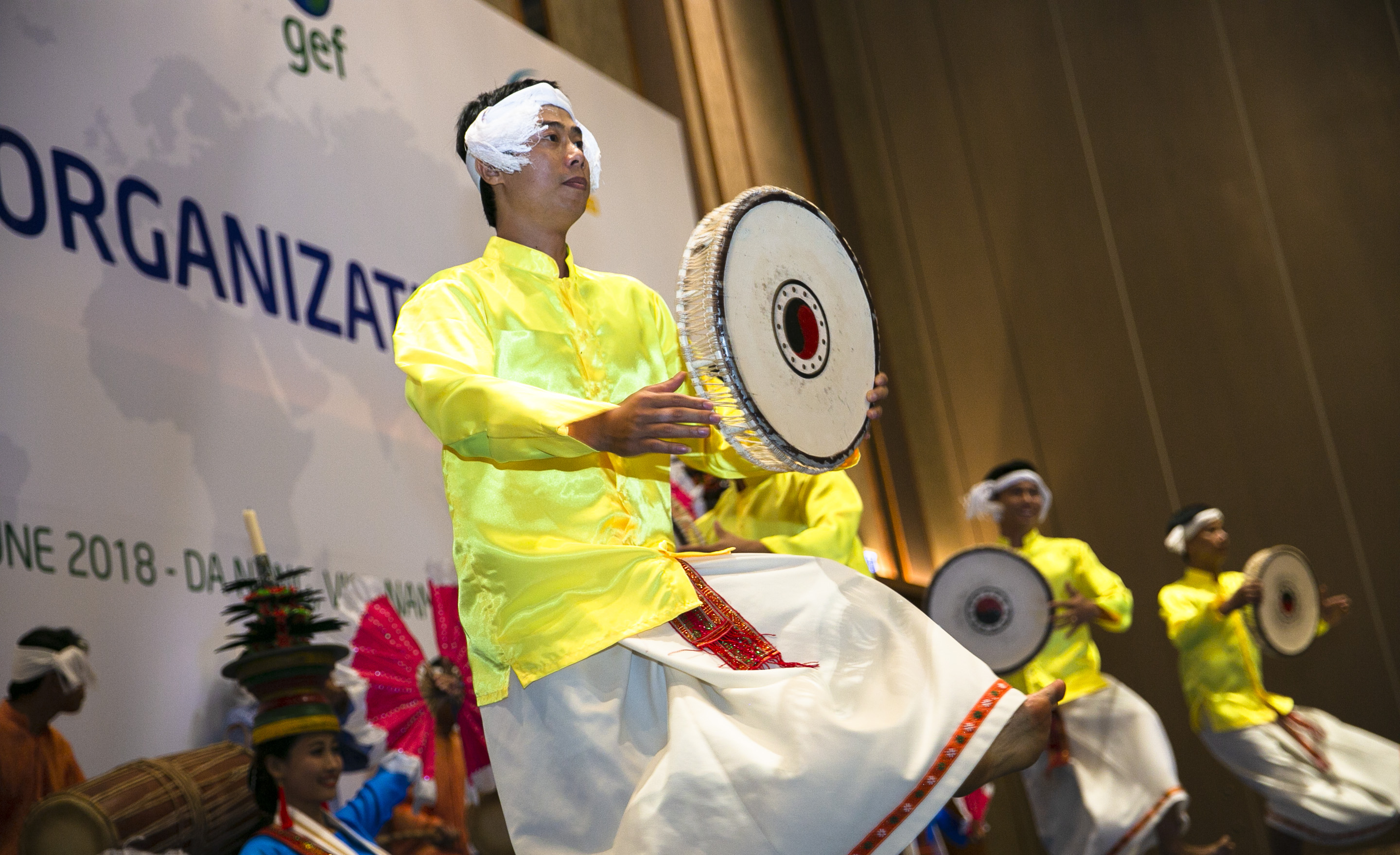
The CSO Forum opens with traditional Vietnamese performances.
Tuesday, 26 June 2018, marked the last day of the 54th Council of the Global Environment Facility (GEF). The Council finalized outstanding issues, including on the Small Grants Programme and the Country Support Programme, and discussed the dates of future Council meetings.
The 24th Council Meeting of the Least Developed Countries Fund (LDCF) / Special Climate Change Fund (SCCF) also convened, after which the GEF Council resumed to approve all decisions, concluding its deliberations at 1:25 pm, with GEF CEO and Chairperson Ishii describing the Council meeting as “historical.”
In parallel, the Civil Society Organizations (CSO) Forum met throughout the day, holding plenary discussions, interactive dialogues and breakout sessions. See more here.
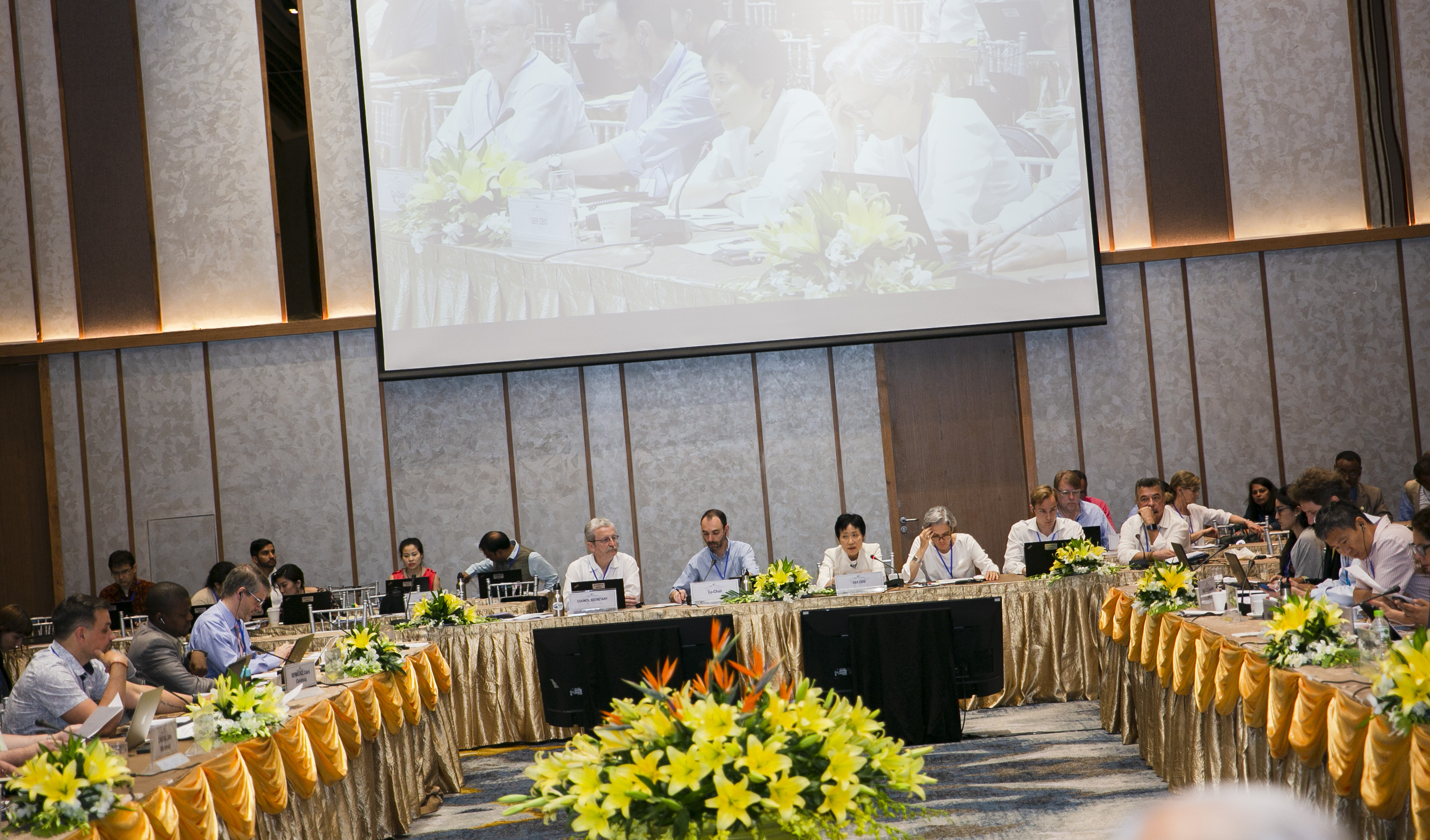
A view of the dais during the Council meeting
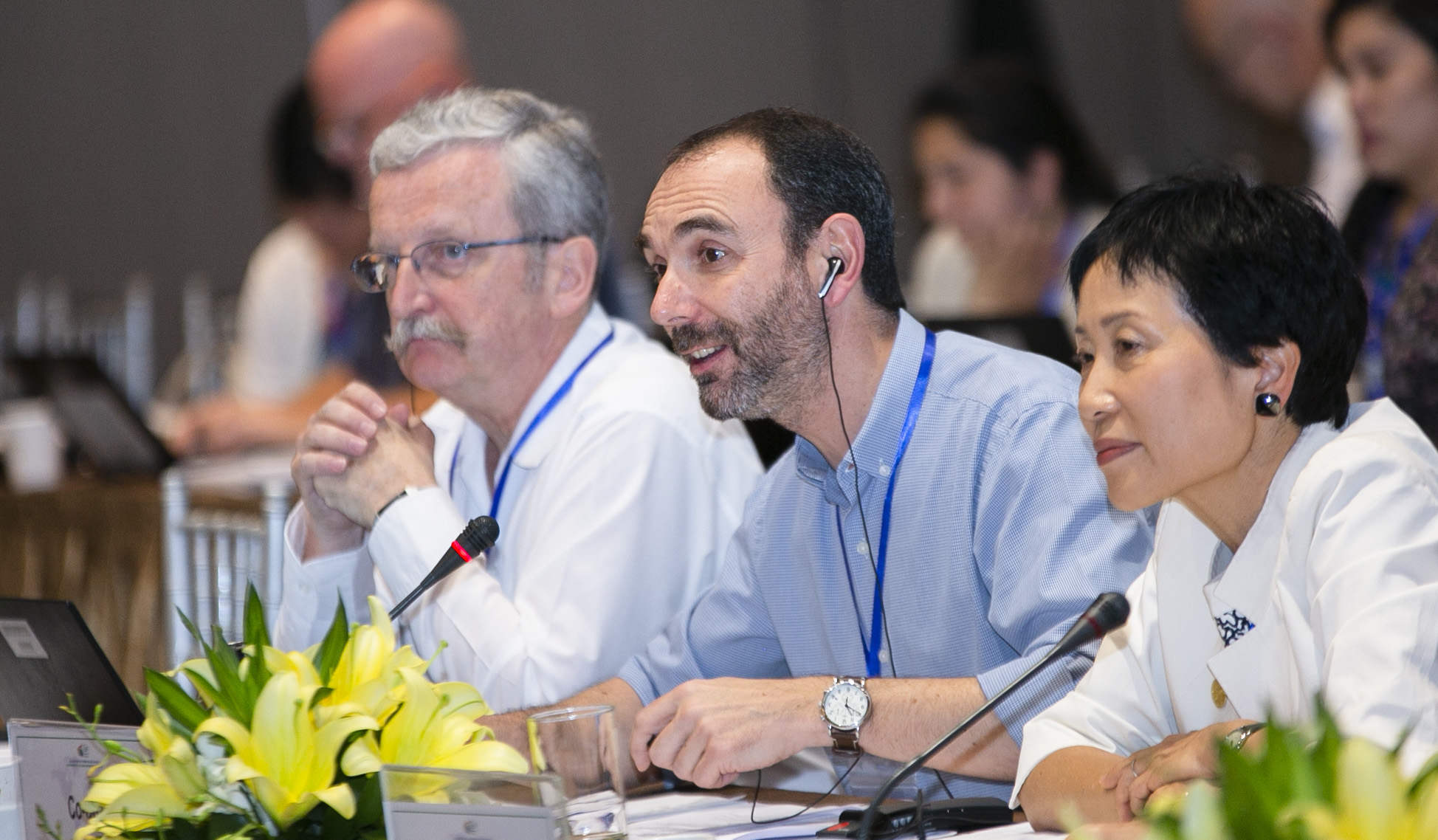
Council meeting Co-Chair Peter Elder, Australia
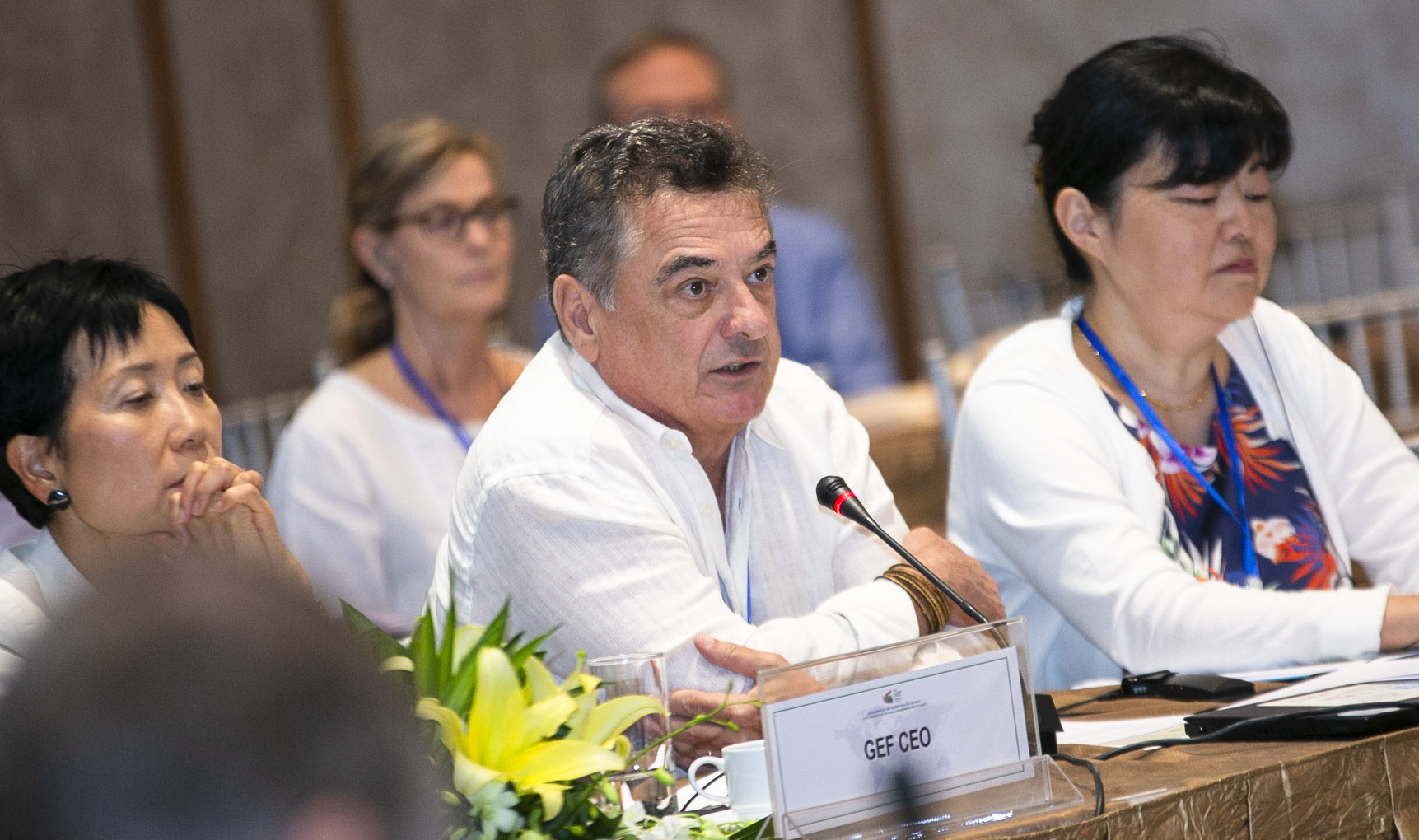
Gustavo Fonseca, GEF Secretariat
The Civil Society Organizations (CSO) Forum
Opening and Welcoming Remarks
On Tuesday, 26 June, Victor Kawanga, Chair, GEF-CSO Network, noted the GEF-CSO Network is in a period of transition and said receiving funding from GEF for the Network’s operation is the “silver bullet” needed to ensure its continued existence.
Le Cong Thanh, Vice-Minister of Natural Resources and Environment, Viet Nam, said further CSO engagement will be a valuable contribution to the successful delivery of the GEF programme over the next four years and said it is only through “joining hands” that green growth can be achieved.
GEF CEO and Chairperson, Naoko Ishii lauded Viet Nam’s pledge to become a leader in achieving green growth and addressing oceans plastics. She said to transform systems, the power of every sector and group needs to be harnessed.
Noting that Indigenous Peoples comprise 5% of the global population, Lucy Mulunkei, Chair, Indigenous Peoples Advisory Group of the GEF, welcomed the opportunity for continued work with the GEF to ensure that the rights and work of Indigenous Peoples are recognized and respected.
Thu-Huyen Thi Nguyen, National Coordinator, Viet Nam Small Grants Programme (SGP), underlined the SGP’s important work with civil society and local communities on local environmental issues, pointing particularly to innovations at the local level that have been scaled up to the national level.
Participants then witnessed a cultural ceremony from Viet Nam’s Cham ethnic group from the Quang Nam province.
Stories of Systems Transformation: Collective Story Harvesting
Nadine McCormick, IUCN, moderated the session, highlighted the role of story-telling and collective story harvesting in illuminating systems transformations. The session comprised 18 pitches and breakout groups, with participants sharing experiences on GEF-SGP project implementation at the local and national levels.
Priscilla Achakpa, Women Environmental Programme, Nigeria, spoke on the role of women in awareness raising on the risks posed by persistent organic pollutants (POPs) to human health and the environment. Mantopi Lebofa, Technologies for Economic Development, Lesotho, stressed that 70% of the country relies on biomass for energy needs, but that this is detrimental to the environment, and highlighted that the GEF has helped transform local communities through partnering with governments to provide clean cookstoves.
Sana Taktak Keskes, Association of Continuity of Generations, Tunisia, highlighted her organisation's work in empowering women in environmental conservation and preservation in the clam sector, and noted that the government had recognized the organization's work. Sasha Middleton, Marine Ecosystems Protected Areas Trust, Antigua and Barbuda, noted that local people are the movers and shakers of transformation, and highlighted the GEF’s role in ensuring that information is shared with the people to promote effective decision making.
Sophiko Akhobadze, Regional Environmental Center for the South Caucasus, Georgia, spoke on changing the mindsets of communities about land degradation, climate change and drought in the country. Mary Jane Enchill, Climate Action Network, Ghana, said through funding from the SGP they engaged in projects to engage CSOs and the private sector to increase their knowledge about the GEF as well as their engagement in the implementation of GEF-7.
Ann Singeo, Ebiil Society, Palau, said her organization has supported women to take greater responsibility for forest protection and management and men to protect the ocean and together bring awareness and education to children. Thelma Munhequette, Africa Foundation for Sustainable Development, Mozambique, said, with respect to chemicals, it is necessary to change behavior so as not to “kill ourselves” and outlined efforts to increase knowledge about the safe use of chemicals.
Hala Murad, Dibeen Association for Environmental Development, Jordan, outlined work to create a coalition to save and protect forests which, experienced challenges with international partner organisations. Salina Abraham, International Forestry Students’ Association, outlined efforts to challenge and change capital markets and decision-making processes through involving youth.
Wuying Lin, Guangxi Biodiversity Research and Conservation Association, China, said his organization has made efforts to conserve nature in the biodiverse region of Guangxi through trusting and empowering communities. Obadiah Ngigi, GreenFi, Kenya, said they had made finance accessible to environmentally vulnerable communities of farmers and fishermen through providing well designed green credit.
Trang Le Thi, GreenViet, Viet Nam, described a project to preserve biodiversity through having a monkey the icon for the local people and empowering them towards environmental stewardship. Tommy Garnett, Environmental Foundation for Africa, Sierra Leone, presented a case on the protection of a wildlife sanctuary with the highest diversity of primates in the world from poaching, which resulted in the creation of a well-known research and ecotourism destination through partnerships with local communities.
Clarence Carver Bacchus, Sustainable Living T&T, Trinidad and Tobago, said that although environmental information sharing has been seen as a “boring” activity, his organization, in partnership with the GEF, has been using film as a medium to share civil society stories in their work on environmental conservation. Michela Izzo, Guakia Ambiente, Dominican Republic, presented on a GEF-SGP project in partnership with the local community to improve environmental protection policies at national and regional levels.
Jonas Kemajou Syapze, Organisation for Environment and Sustainable Development, Cameroon, shared a GEF-SGP project to improve human health in the environment with a focus on women in the smoked fish sector. Liliana Sin, NGO Krass, Uzbekistan, spoke on a GEF-SGP project on renewable energy and energy efficiency, which has been key to local community empowerment.
Closing Session
Plenary reconvened after four break-out sessions on effective collaborations for systems change, the power of advocacy and innovative environmental action, operationalizing GEF stakeholder engagement, and effective collaborations for sustainable transformation.
Moderated by Lalit Mohan, Regional Focal Point for South Asia, GEF-CSO Network, the CSO Forum fine-tuned the Civil Society Call for Action through recommendations from the breakout session moderators, with the Call to Action to be presented to the 6th GEF Assembly.
The moderator for the session on effective collaboration for systems change, Zaheer Fakir, Head of the International Governance and Relations Division, Department of Environmental Affairs, South Africa, said that CSOs and governments need to create an enabling environment for the voices of communities to be heard.
Yeshing Juliana Upún Yos, Coordinator, Sotz’il, presented key recommendations including on: the need to ensure the mainstreaming of sustainable development into all GEF projects; mainstreaming CSOs into all GEF projects at national levels; and ensuring ecological footprint analysis are conducted at all levels.
Jimmiel Mandima, Director for Program Design and Partner Relations, African Wildlife Foundation, emphasized the need to allocate commensurate resources for capacity building and to make free prior and informed consent mandatory to ensure environmental safeguards.
Akhteruzzaman Sano, Vice Chair GEF-CSO Network, proposed that before each regional CSO workshop there should be organized a half-day capacity building workshop to teach participants to train CSOs in their countries.
Mohan welcomed further inputs on the Civil Society Call for Action document and said these inputs, along with inputs gathered from hundreds of CSOs over the last four months, will inform the final document.
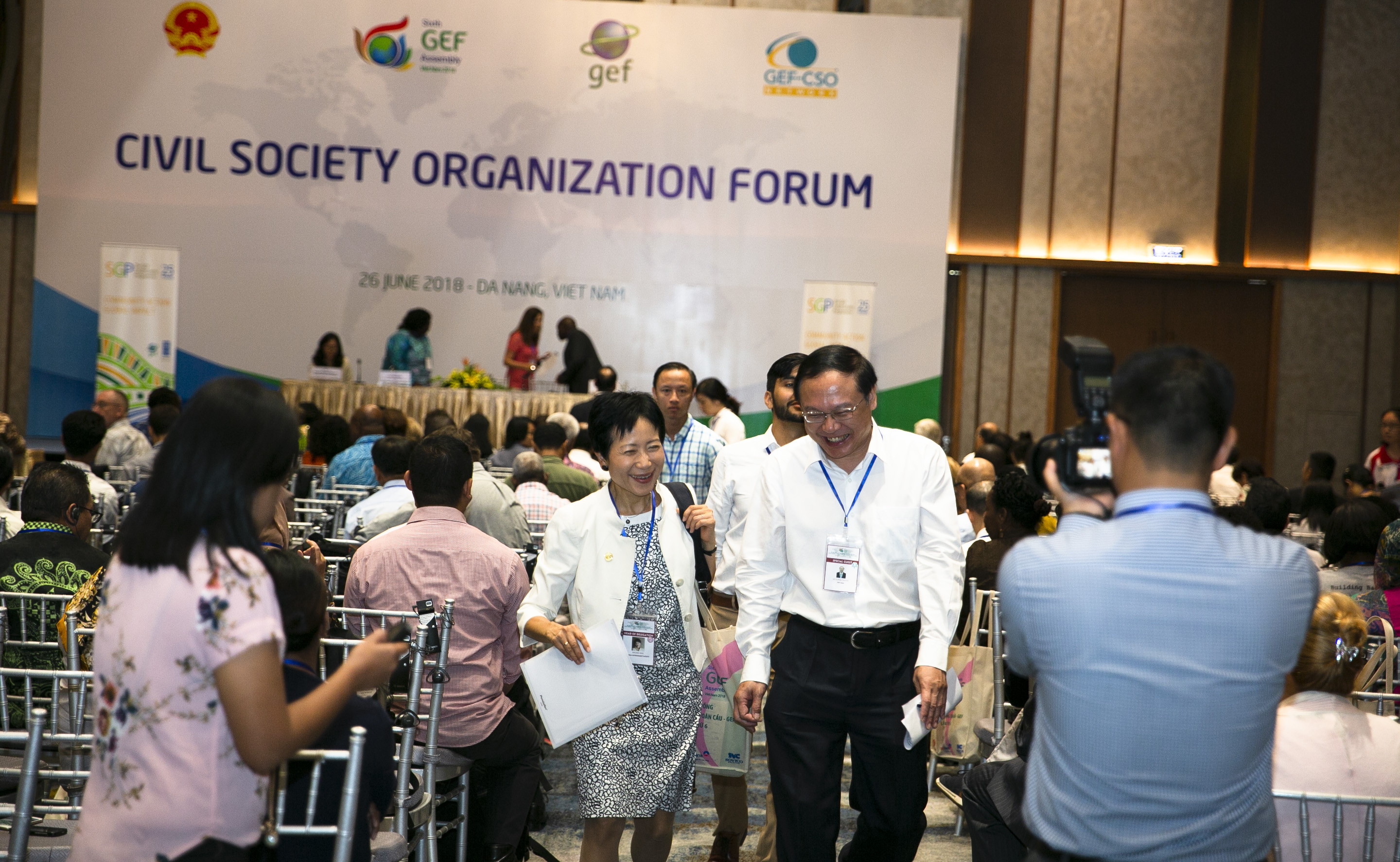
GEF CEO and Chairperson Naoko Ishii and Le Cong Thanh, Vice Minister, Ministry of Natural Resources and Environment, Viet Nam, at the opening of the CSO Forum
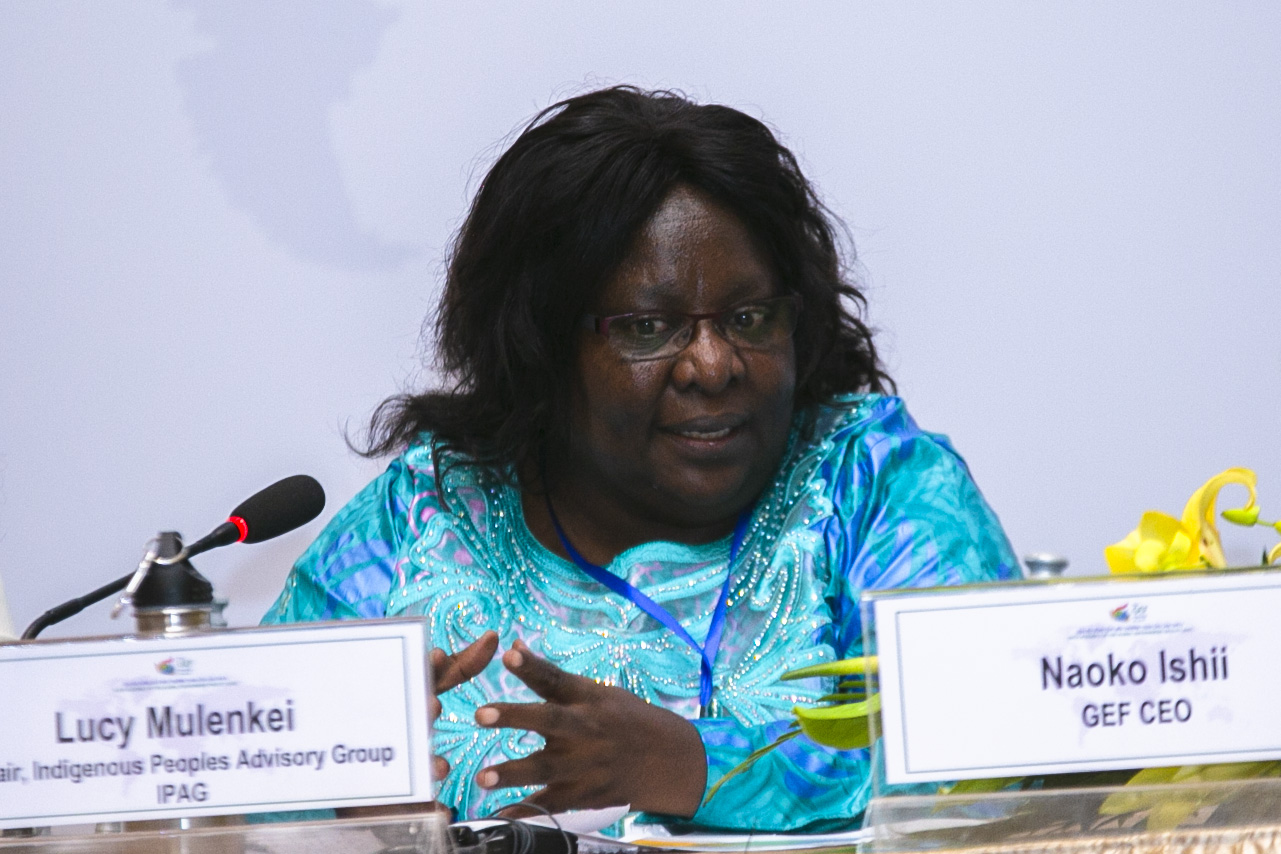
Lucy Mulenkei, Chair, Indigenous Peoples Advisory Group (IPAG)

Thu-Huyen Thi Nguyen, Viet Nam SGP National Coordinator
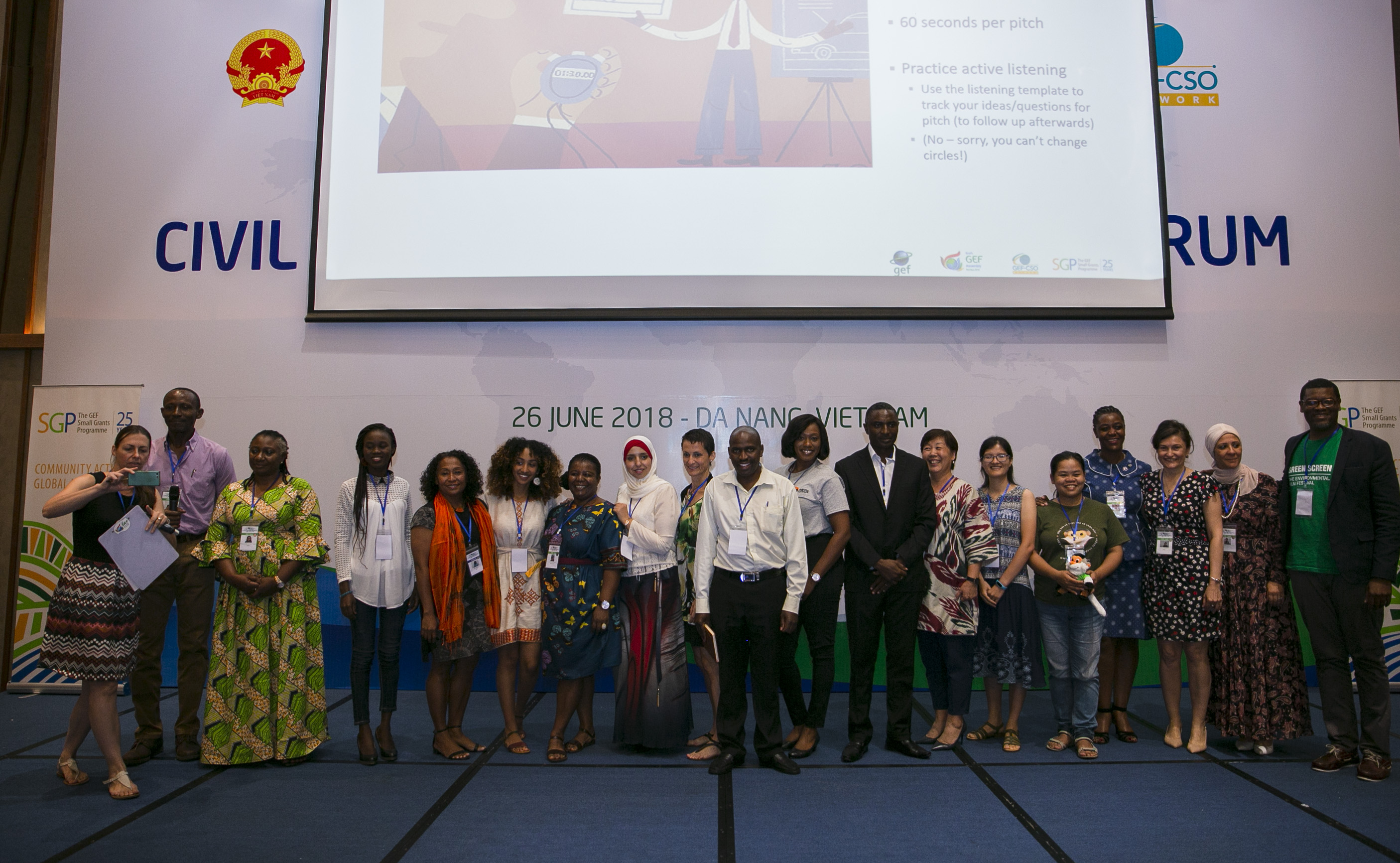
Group photo of the story tellers
GEF Small Grants Programme - 25th Anniversary Reception
On Tuesday evening, the GEF Small Grants Programme (SGP) hosted a reception to celebrate its 25th Anniversary. The SGP provides small grants of up to US$50,000 and has funded more than 21,000 projects since 1992. Yoko Watanabe, Global Manager, SGP, welcomed participants to the reception by underscoring the innovative work of the SGP over the past 25 years.
Following a short video highlighting the contributions of local communities, Adriana Dinu, Executive Coordinator, UNDP Global Environmental Finance Unit, said that the SGP is an incubator of innovation that provides thousands of examples of local solutions to global challenges that can be scaled up.
Tran Hong Ha, Minister of Natural Resources and Environment, Viet Nam, delivered a keynote address, thanking SGP for effectively funding programmes that support civil society in implementing activities related to environmental protection and sustainable livelihoods. He expressed hope for continued cooperation between the SGP and Viet Nam.
Urging the SGP to create systemic change, Andrew Steer, President and CEO, World Resources Institute, praised the SGP for being transformative and hugely successful at the project level and looked forward to the next 25 years.
Lucy Mulenkei, Chair, Indigenous Peoples Advisory Group of the GEF, said that most beneficiaries of the SGP are indigenous peoples and local communities and that the SGP should be scaled up to ensure additional project funding.
Lyonpo Damcho Dorji, Minister of Foreign Affairs, Bhutan, said that the SGP demonstrates there can be a balance between human needs and environmental imperatives. Naoko Ishii, GEF CEO and Chairperson, said that the GEF Council strongly supports the SGP, highlighting the importance of recognizing the power of the local commons to transform the global commons. The reception also included the inauguration of a commemorative stamp and an anniversary photobook.
The reception concluded with a dance and music performance by the Co Tu Indigenous Peoples of Da Nang.
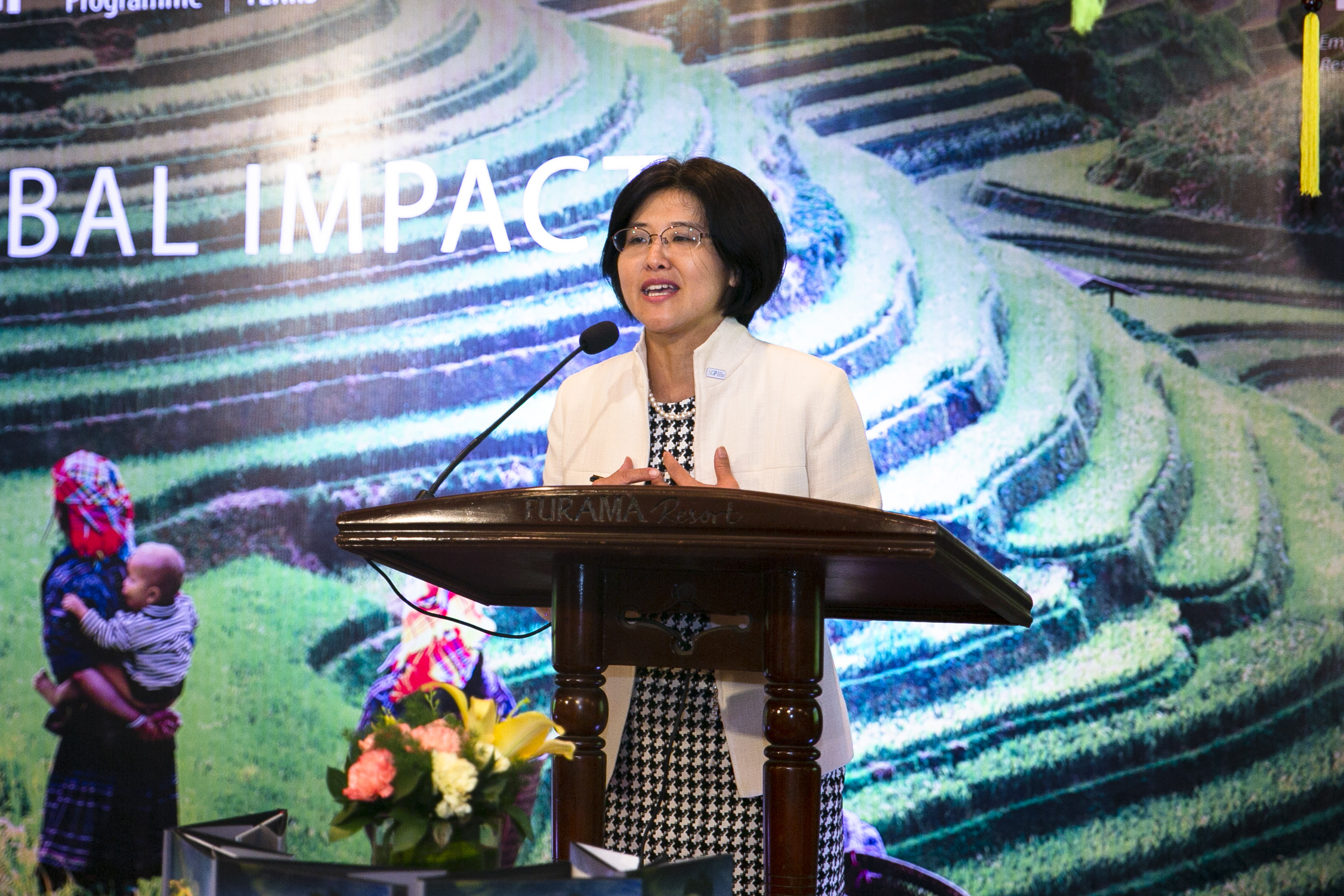
Yoko Watanabe, Global Manager, Small Grants Programme
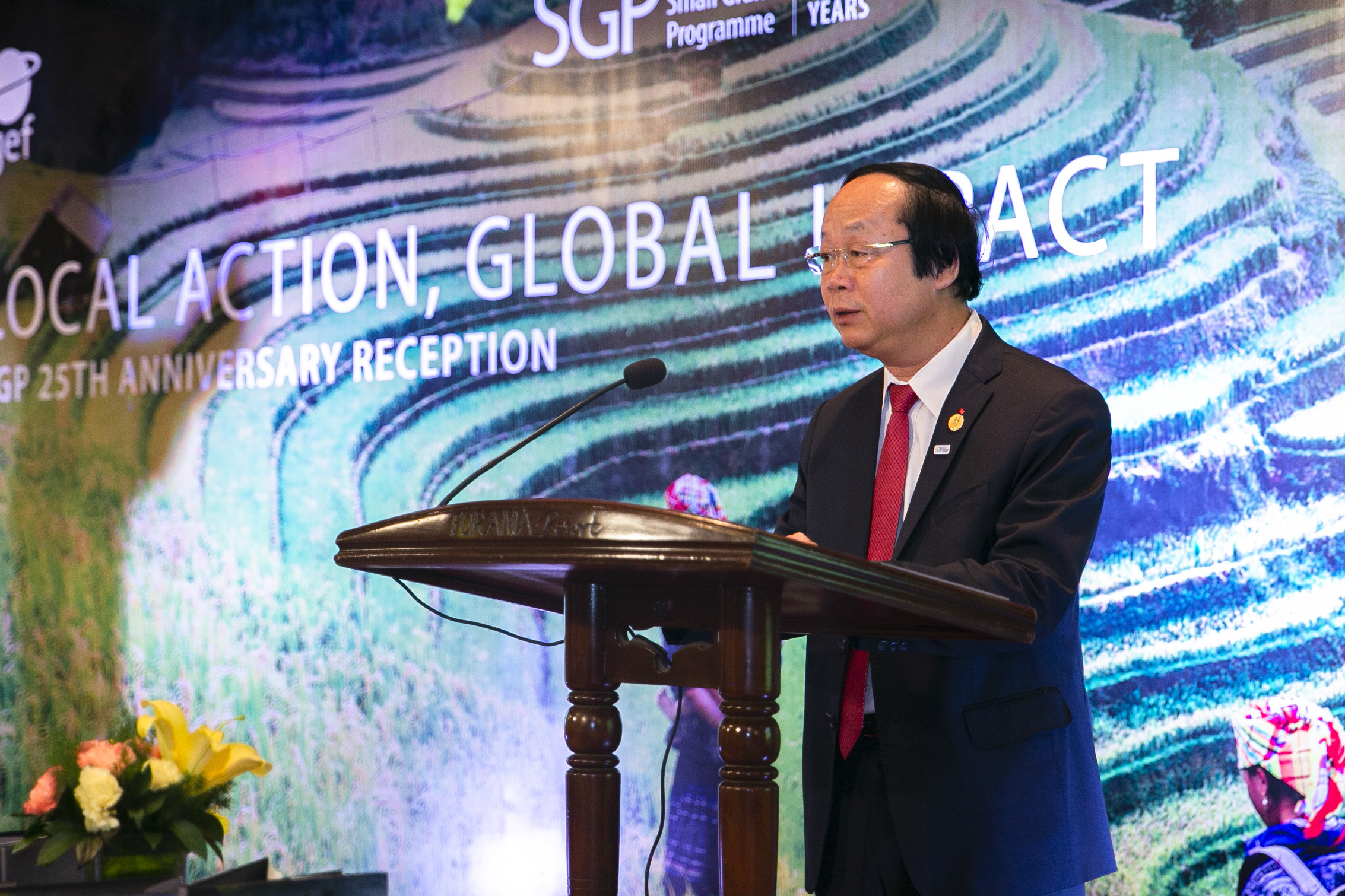
Tran Hong Ha, Minister, Ministry of Natural Resources and Environment, Viet Nam
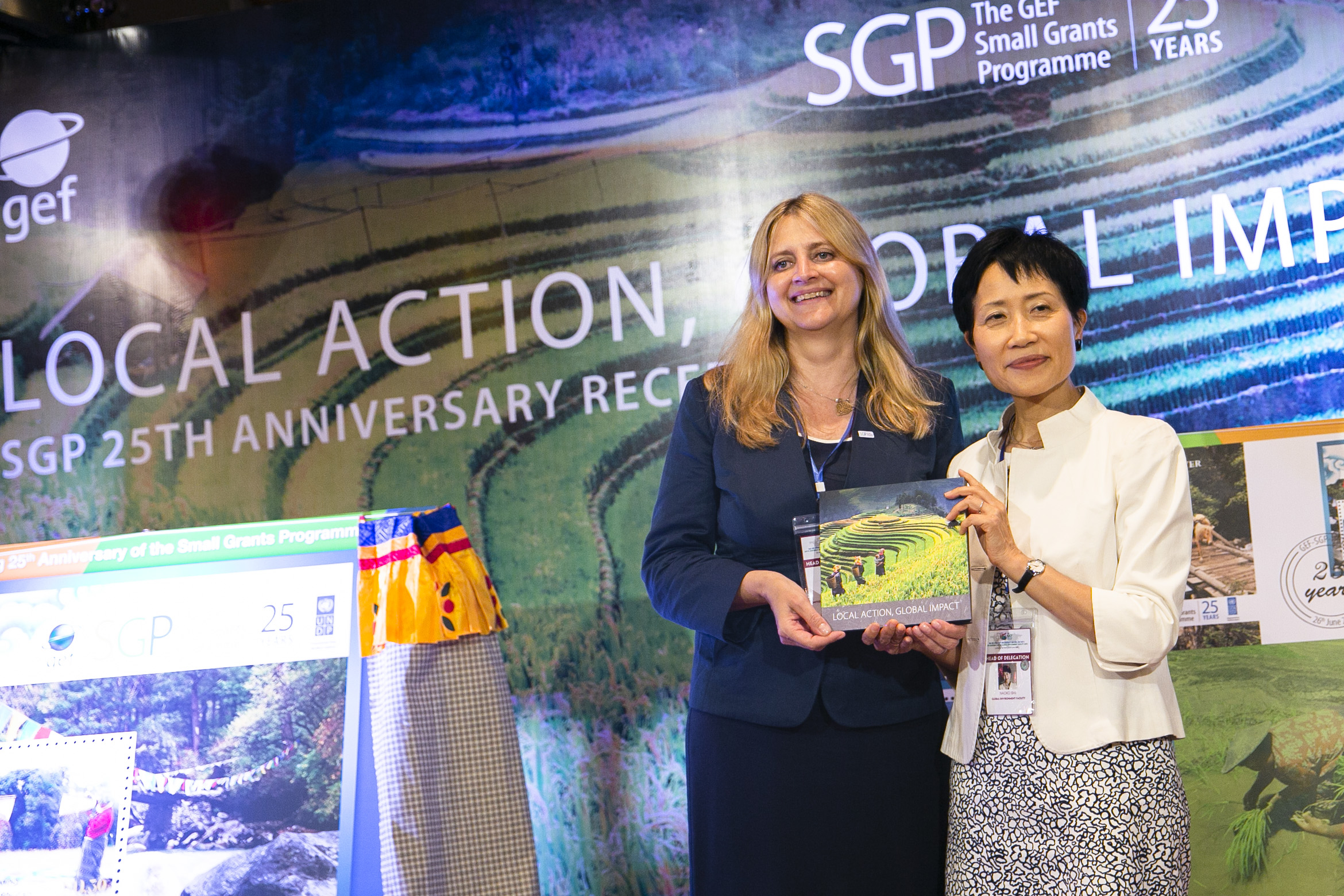
Adriana Dinu, Executive Coordinator, UNDP Global Environmental Finance Unit and Naoko Ishii, GEF CEO and Chairperson
IISD Reporting Services, through its ENB+ Meeting Coverage, provided daily photo and video coverage, and has produced a summary report from the GEF Council Consultation Meeting with CSOs, 54th GEF Council Meeting, 24th Meeting of the LDCF/SCCF Council, and 6th GEF Assembly.
Photos by IISD/ENB | Sean Wu
+ Visit the web coverage for Tuesday, 26 June 2018
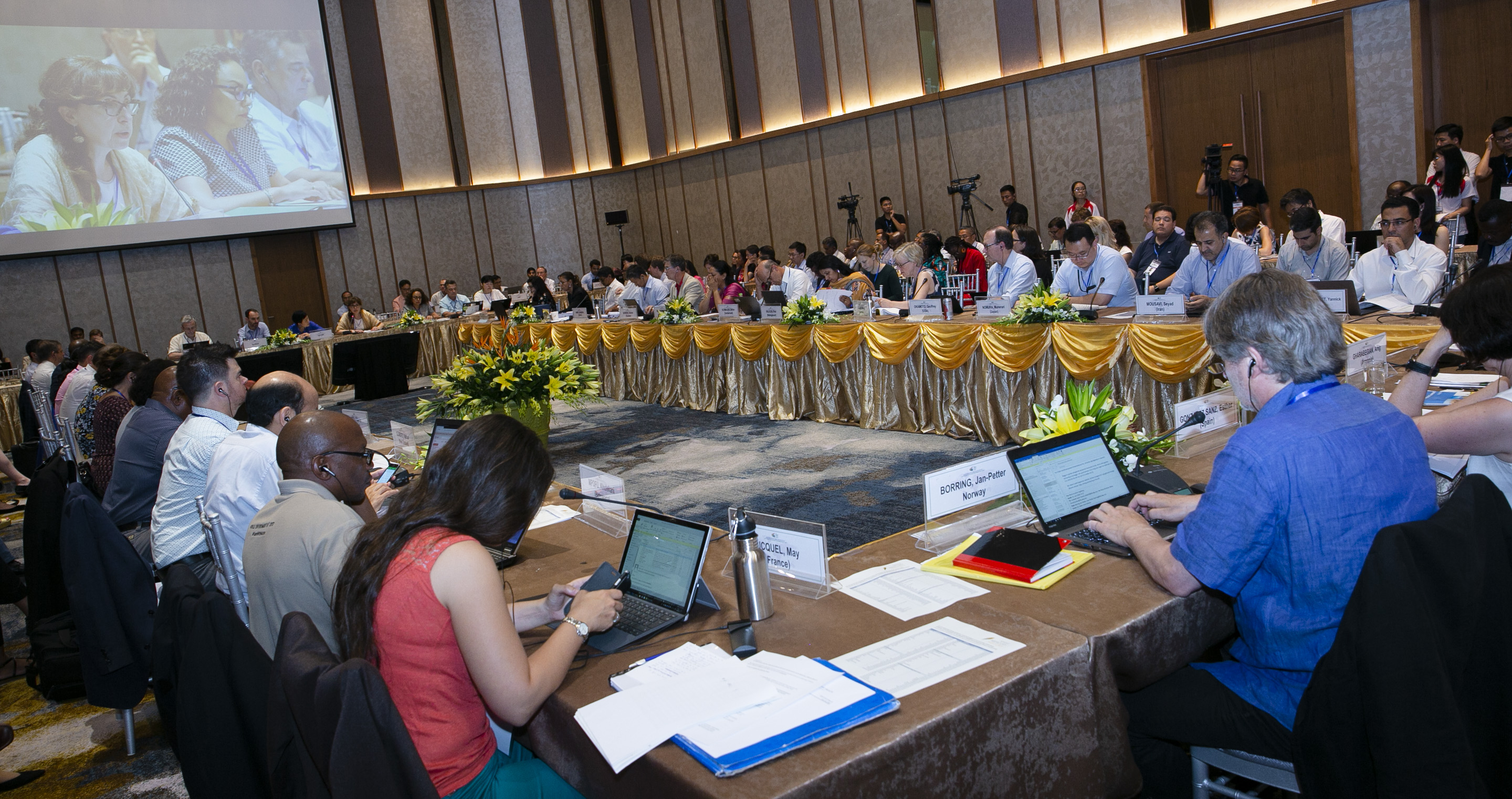
Participants during the afternoon plenary
The 54th meeting of the Council of the Global Environment Facility (GEF) met for a second day on Monday, 25 June 2018, in Da Nang, Viet Nam. In the morning, participants heard presentations from the Scientific and Technical Advisory Panel (STAP) on upcoming work by the Panel, and by the Independent Evaluation Office (IEO) on the Semi-Annual Evaluation Report: June 2018.
In the afternoon, the Council heard reports from Rossana Silva Repetto, Executive Secretary, Minamata Convention on Mercury, and Cristiana Pașca Palmer, Executive Secretary, Convention on Biological Diversity, on the role of the GEF in supporting the implementation of both conventions’ activities.
Monday’s other highlights included:
- The approval of the GEF Trust Fund Work Programme to the tune of US$63.4 million;
- The approval of the IEO budget of US$4.571 million;
- Discussions concerning the GEF’s relations with the conventions and other international institutions;
- The approval of an Memorandum of Understanding (MoU) between the GEF and the UNCCD COP on countries experiencing serious droughts and/or desertification, particularly Africa;
- The approval of decisions related to the Terms of Reference (ToR) for the Private Sector Advisory Group, ToR for, and Membership of, the Ad Hoc Working Group on Governance, and updating the System for Transparent Allocation of Resources (STAR);
- Discussions on the implementation arrangements for the GEF Small Grants Programme under the GEF-7 replenishment; and
- Discussions on the effect of the diminished replenishment to multilateral environmental agreements for which the GEF serves as a financial mechanism.
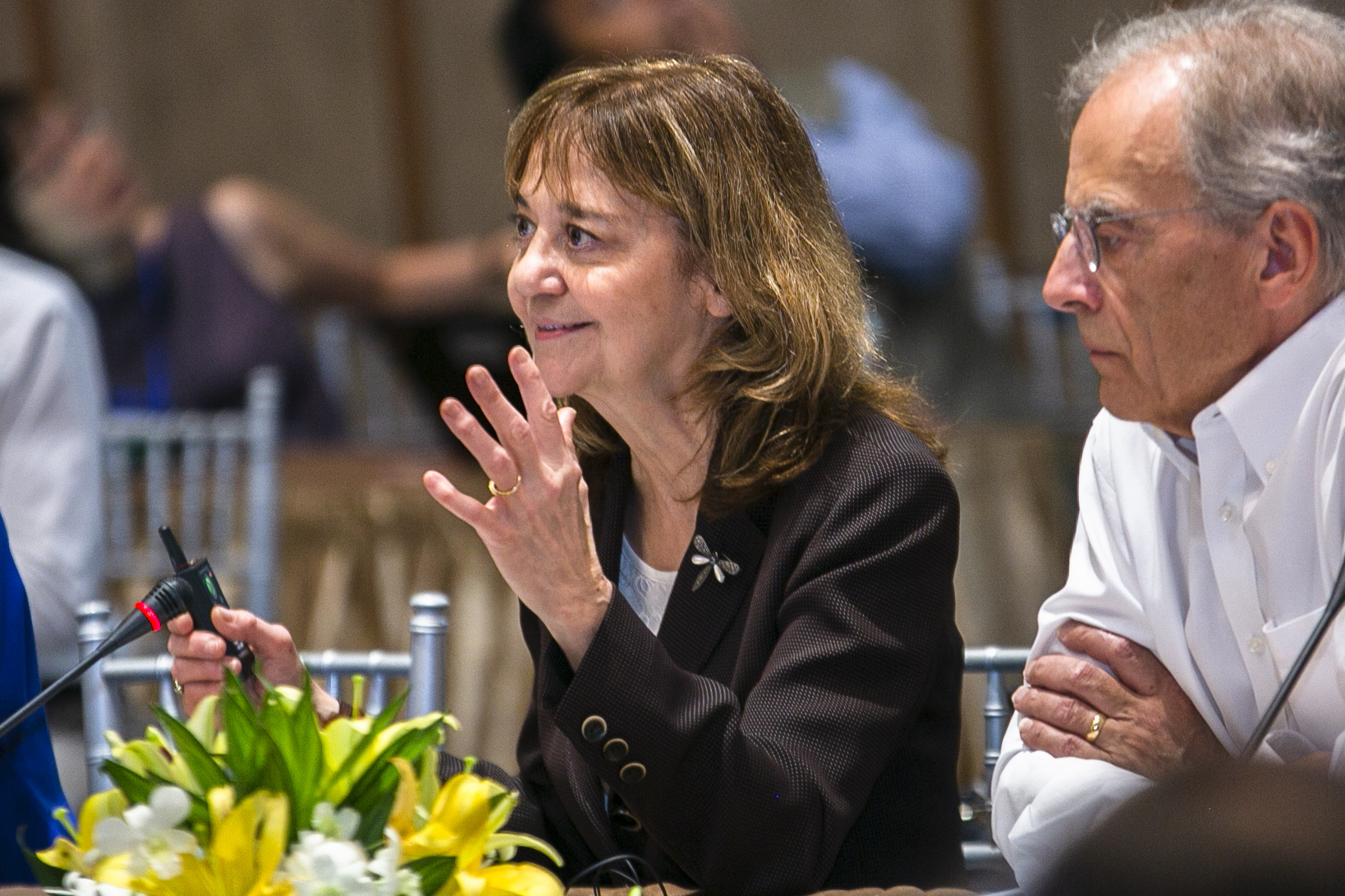
Rosina Bierbaum, Chair of the Scientific and Technical Advisory Panel (STAP)
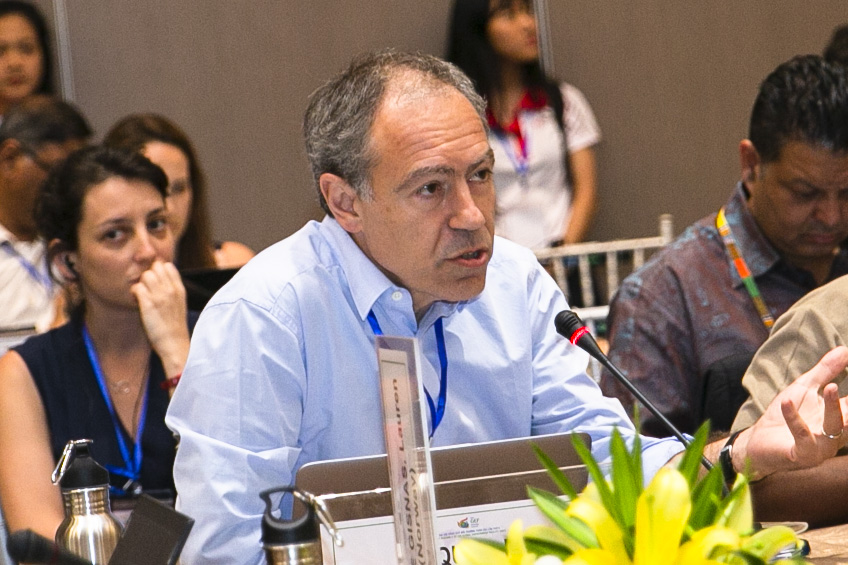
François-Xavier Duporge, France
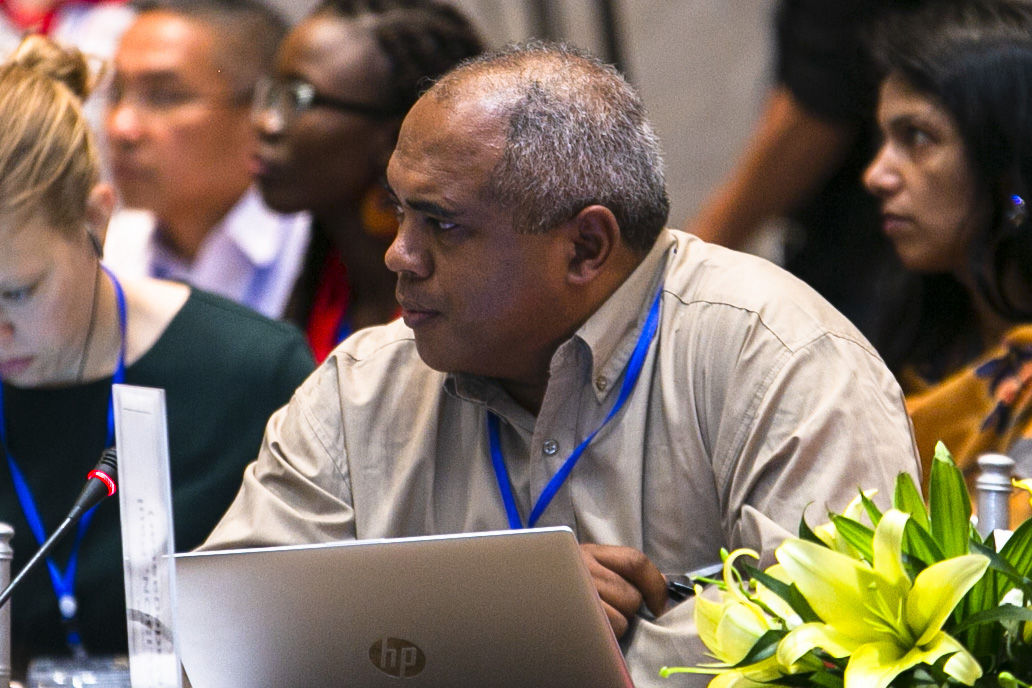
Paul Ralison, Madagascar
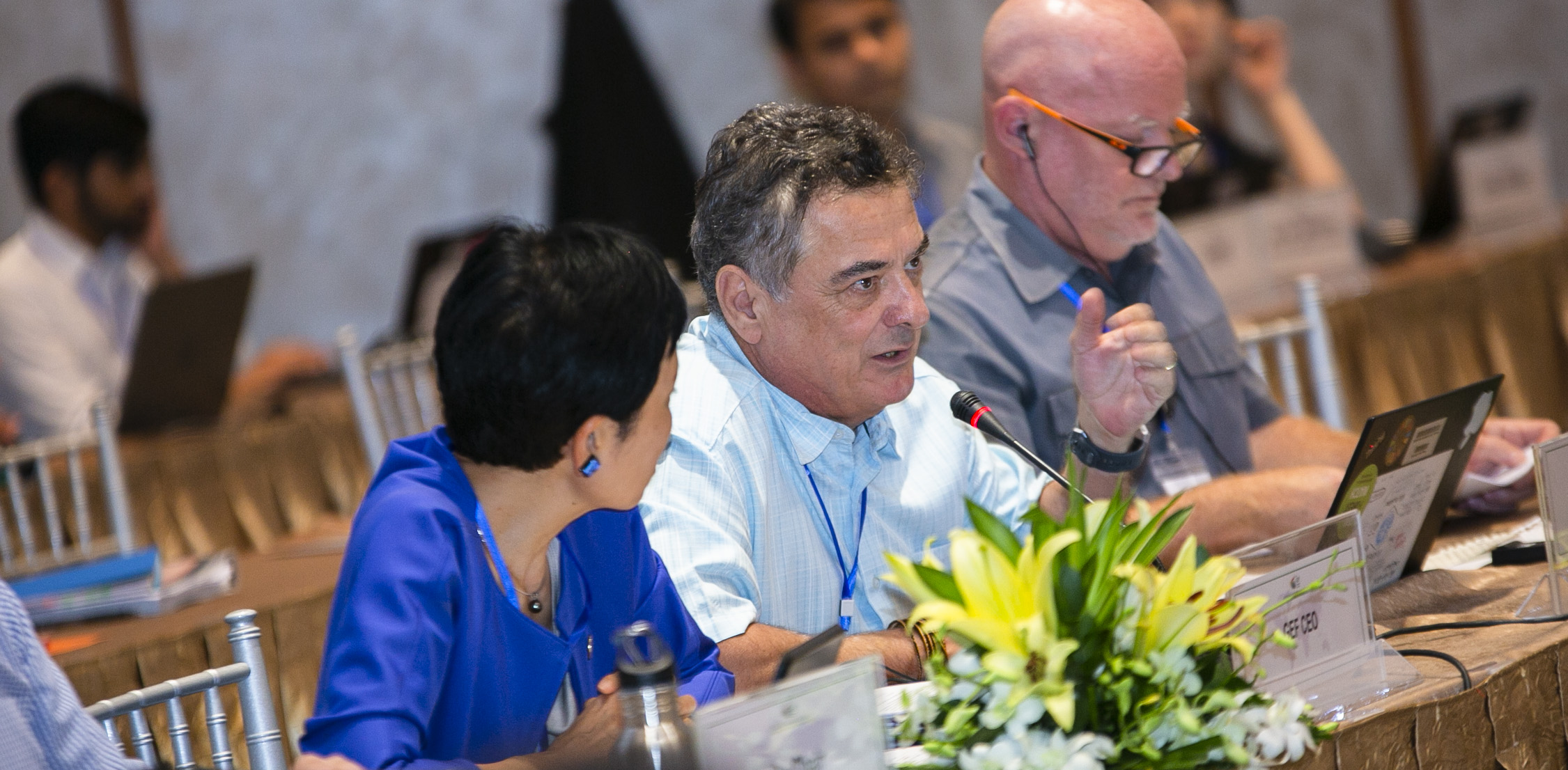
Gustavo Fonseca, GEF Secretariat
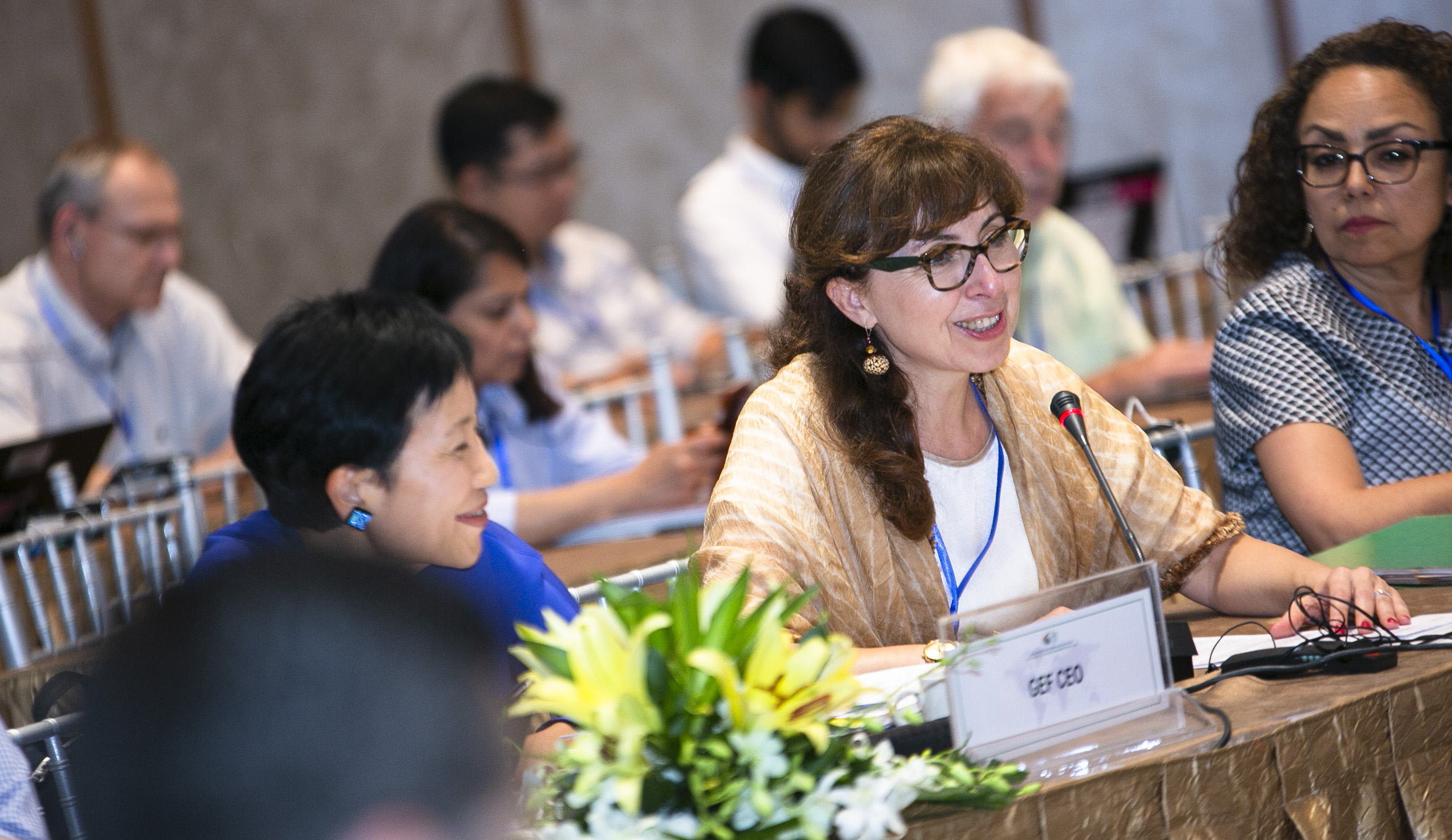
Cristiana Pașca Palmer, Executive Secretary, Convention on Biological Diversity
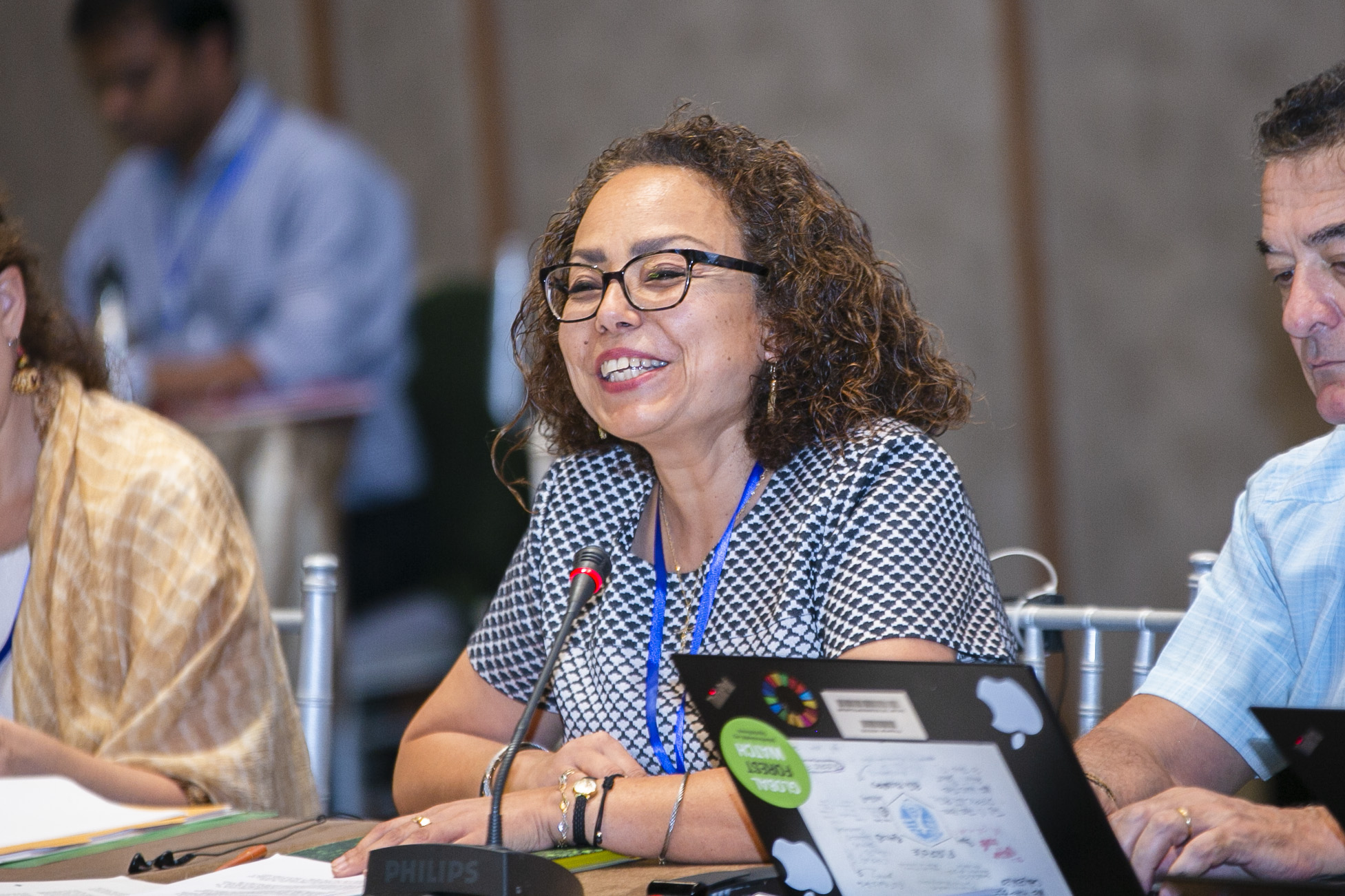
Rossana Silva Repetto, Executive Secretary, Minamata Convention on Mercury
IISD Reporting Services, through its ENB+ Meeting Coverage, provided daily photo and video coverage, and has produced a summary report from the GEF Council Consultation Meeting with CSOs, 54th GEF Council Meeting, 24th Meeting of the LDCF/SCCF Council, and 6th GEF Assembly.
Photos by IISD/ENB | Sean Wu
+ Visit the web coverage for Monday, 25 June 2018
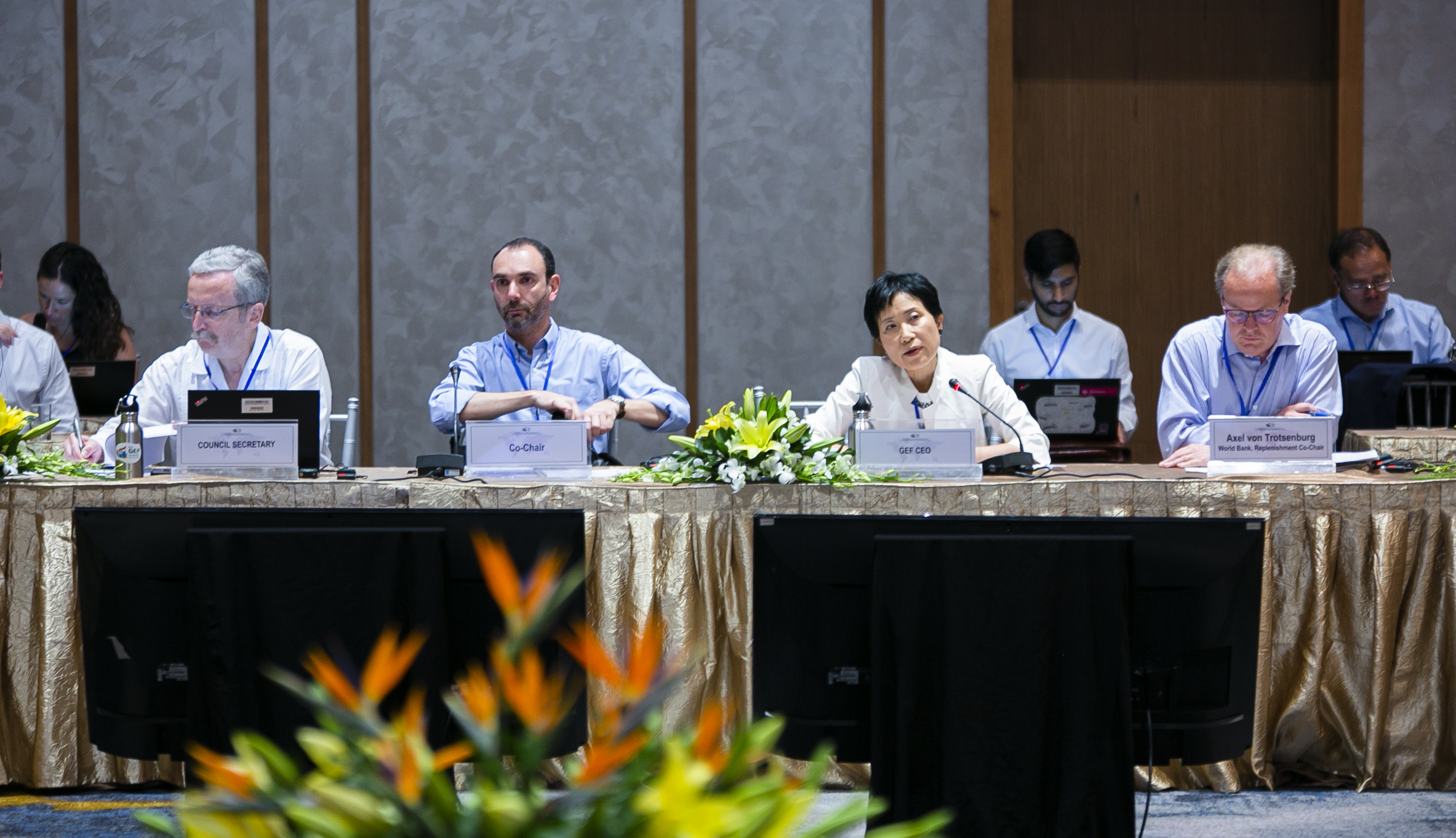
L-R: William Ehlers, GEF Secretariat; Co-Chair Peter Elder, Australia; GEF CEO and Chairperson Naoko Ishii; and Axel van Trotsenburg, World Bank, and GEF-7 Replenishment Co-Chair
On Sunday, 24 June 2018, the 54th meeting of the Council of the Global Environment Facility (GEF) opened in Da Nang, Viet Nam. In her opening remarks, Naoko Ishii, GEF CEO and Chairperson, commented on the “long and difficult” negotiations of the seventh replenishment of the GEF Trust Fund (GEF-7), but highlighted that through the negotiations, GEF-7 now has a number of policies to guide its implementation. She expressed hope that the Facility would be more effective and efficient during the GEF-7 period, and noted that the GEF Assembly, scheduled to be held later in the week, would be a useful platform to “kick start” GEF-7 implementation.
Peter Elder, Australia (Council Member for Australia, New Zealand, and Republic of Korea), was elected Co-Chair of the meeting.
In the morning, Ishii presented the Summary of the GEF-7 Replenishment Negotiations, highlighting the agreement of a replenishment of US$4.1 billion, attributing the decreased replenishment compared to previous years to currency fluctuations, among other issues.
Key highlights of Day One included discussions on, inter alia:
- the Seventh Replenishment of the GEF Trust Fund (GEF-7), which has been considered at four replenishment meetings from March 2017 to April 2018;
- the GEF Gender Implementation Strategy, which aims to mainstream gender in the design, implementation, and evaluation of GEF programmes and projects;
- the updated co-financing strategy, with a new overall co-financing ratio of 7:1;
- the GEF Partnership, where delegates considered whether to defer to the 55th Council meeting, a decision on the application of a 30% ceiling on the GEF’s share of an Agency’s portfolio;
- updating the System for Transparent Allocation of Resources (STAR); and
- the 2019 GEF Business Plan and Corporate Budget, approving a corporate budget from the GEF Trust Fund of US$27.971 million.
In the evening, participants attended a reception hosted by the GEF Secretariat.

GEF Chief Executive Officer (CEO) and Chairperson Naoko Ishii opens the 54th GEF Council meeting in Da Nang, Viet Nam
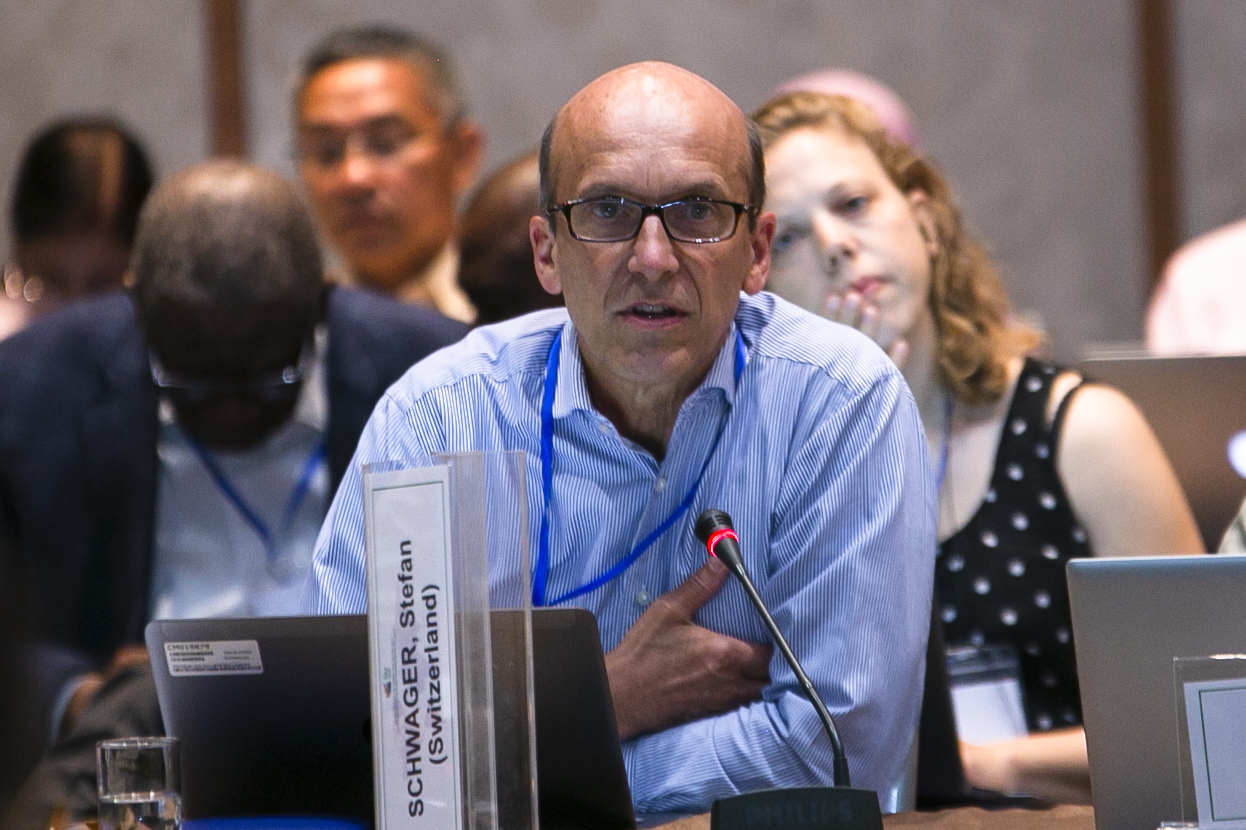
Stefan Schwager, Switzerland
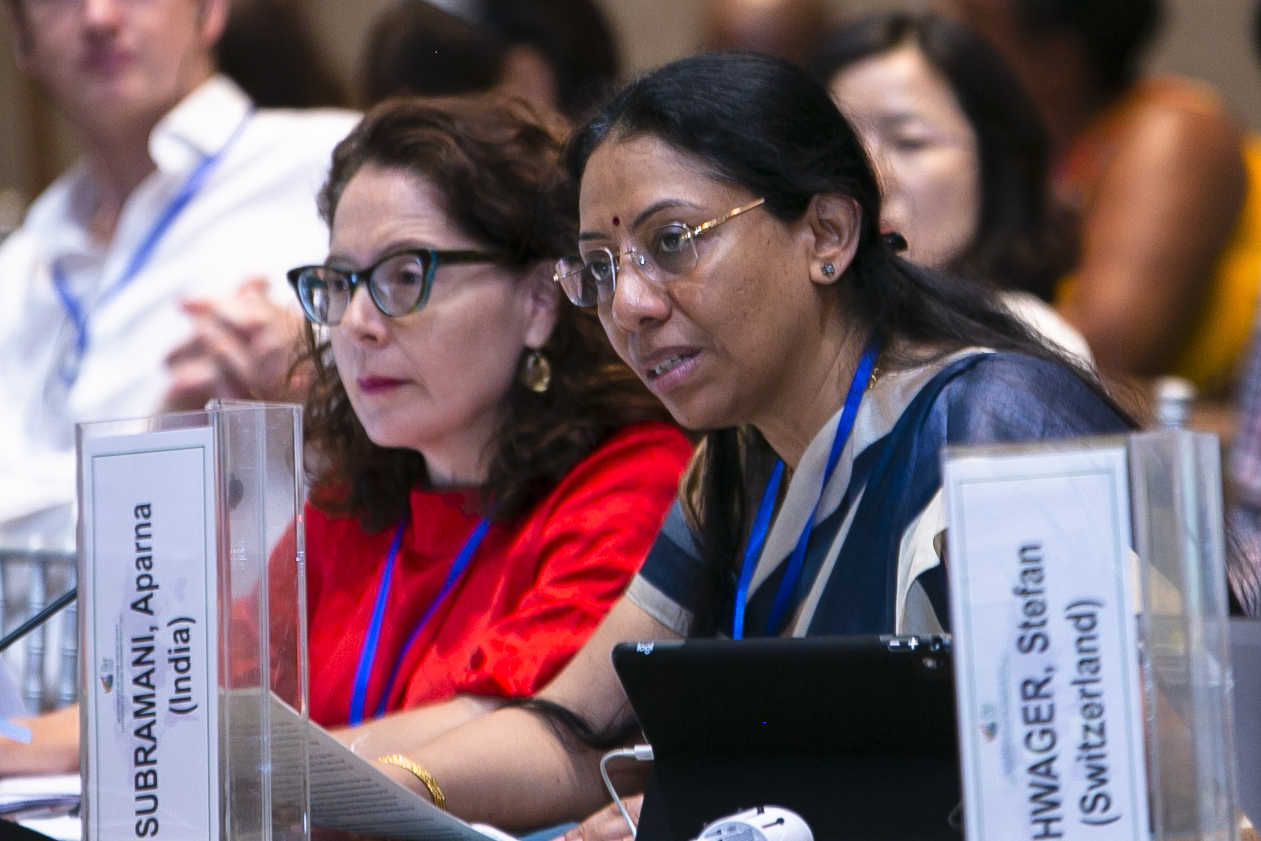
Aparna Subramani, India
IISD Reporting Services, through its ENB+ Meeting Coverage, provided daily photo and video coverage, and has produced a summary report from the GEF Council Consultation Meeting with CSOs, 54th GEF Council Meeting, 24th Meeting of the LDCF/SCCF Council, and 6th GEF Assembly.
Photos by IISD/ENB | Sean Wu
+ Visit the web coverage for Sunday, 24 June 2018
 Funding for coverage of the GEF Council Consultation Meeting with CSOs, 54th GEF Council Meeting, 24th Meeting of the LDCF/SCCF Council, and 6th GEF Assembly, has been provided by the GEF Secretariat
Funding for coverage of the GEF Council Consultation Meeting with CSOs, 54th GEF Council Meeting, 24th Meeting of the LDCF/SCCF Council, and 6th GEF Assembly, has been provided by the GEF Secretariat










































